Synology DS723+ NAS Drive – Does It Deserve Your Data?
The Synology DS723+ NAS is one of the most capable 2-Bay systems that the brand has ever released, featuring a number of series-firsts in terms, yet still maintaining largely the same price point as the other two bays in the plus series to date. However, there is no avoiding that this is not going to be a system that suits everyone and although I waxed lyrical and was largely positive about its features in my Synology DS723+ NAS Review, there are definitely going to be some elements of the DS723+ NAS that will convince you to opt for a different solution. So, today I want to discuss the five things about the Synology DS723+ that make it a must-have NAS in 2023 and five things that will possibly convince you that your money and data should go elsewhere. Let’s begin.
Note – You can find my full ‘Before You Buy’ video on the Synology DS723+ NAS here. It covers mostly the same points, but also touches on a few more.
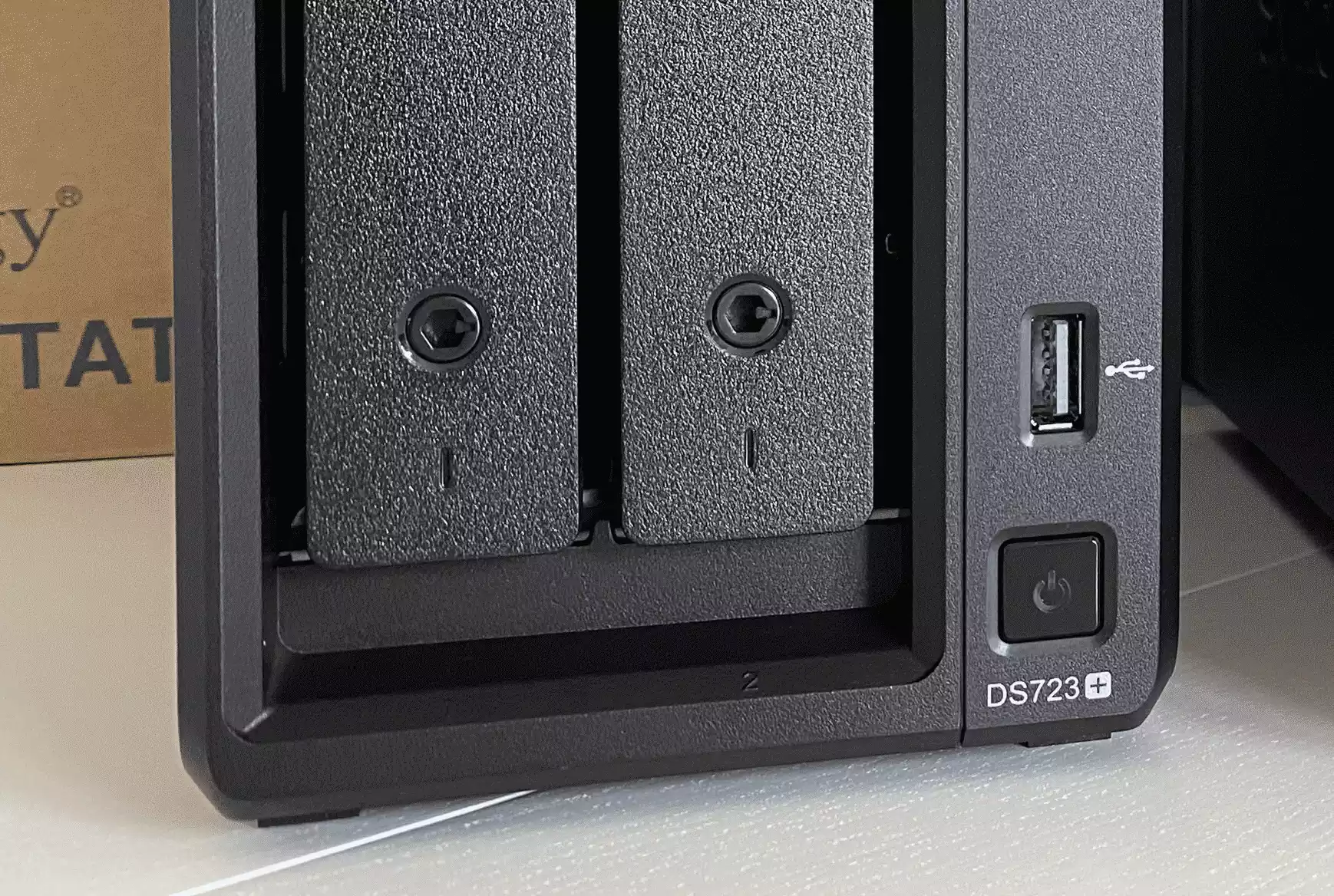
Reasons You SHOULD Buy the Synology DS723+ NAS
So, first things first! Here are five reasons why the Synology DS723+ NAS might well be exactly the private desktop server that you have been waiting for.
The 10GbE Upgrade on the DS723+
It may seem especially unusual for Synology to provide the option of 10GbE on a 2-Bay NAS (as the brand has been oddly reluctant to provide greater than gigabit connectivity on their smaller devices till now) but this was a feature in one form or another that users who have been looking at the expandable 2-Bay and 4-Bay diskstation series (DS716+, DS718+ and DS720+) have been requesting for YEARS! The Synology DS723+ NAS arrives with an upgrade slot on the rear of the chassis (PCIe Gen 3 x2) that allows the installation of a 10GbE (10GBASE-T) network upgrade module that allows the system to upgrade towards a 1,000MB/s network connection! With the DS723+ NAS running on a very competent and fast-file-service internal architecture AND supporting 2 drives in a RAID environment to increase internal performance, the option to scale up the external connectivity to 10x that of traditional gigabit is fantastic. Although there is a question of whether it is possible to fully saturate a 10GbE/1,000MB/s connection with a 2x SATA drive NAS, you also need to factor in the option to expand the system by 5 more bays with the DX517, or by running a storage pool on one or more of the M.2 NVMe SSD bays. Either of these options will allow that 10 Gigabit connection to be fully saturated with ease.
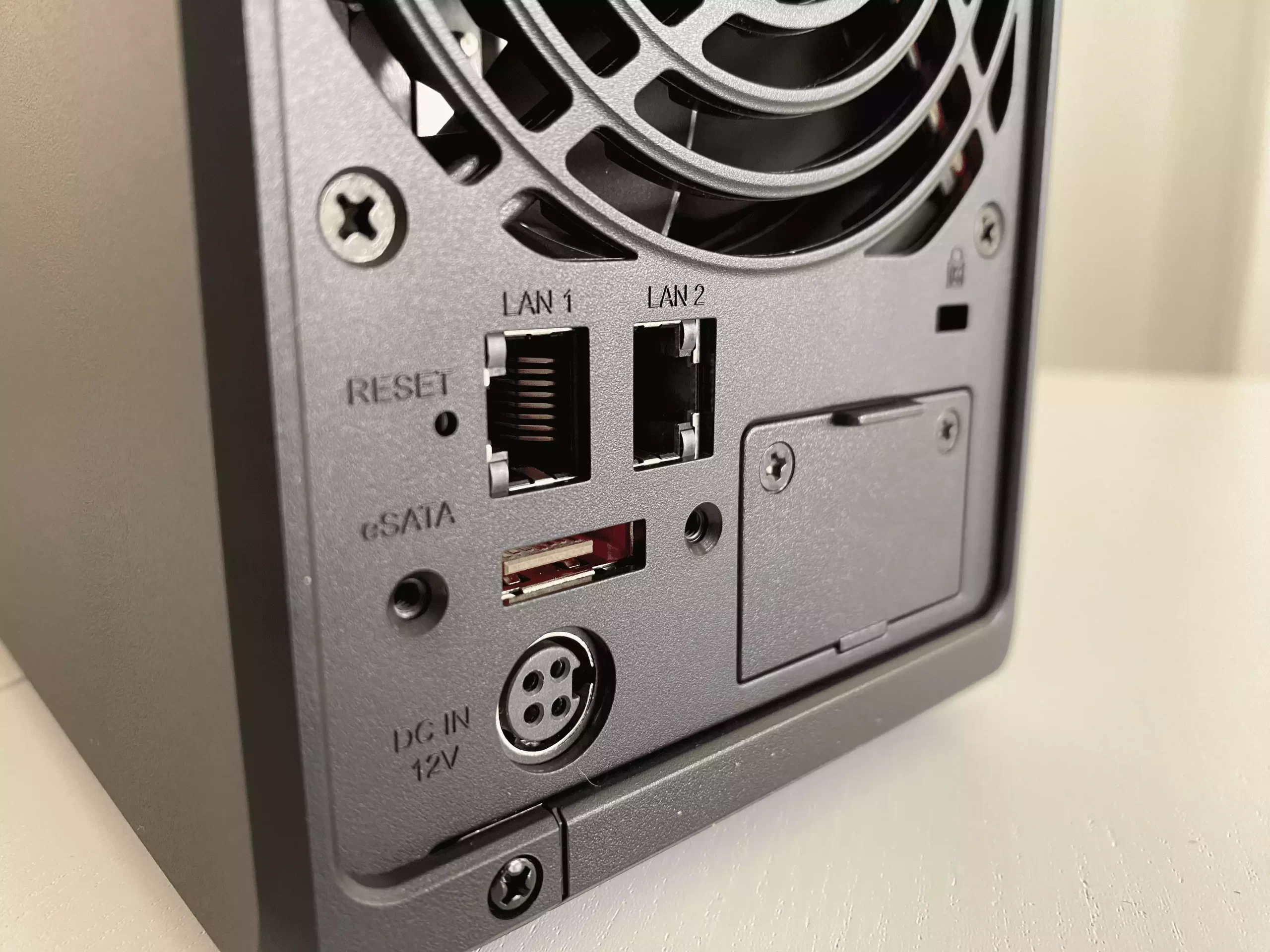
The network upgrade choice on the DS723+ is delivered via an optional purchase of the Synology E10G22-T1-mini (find the Synology E10G22-T1-MINI here on Amazon), and it is a 1x Port 10G card, with its own onboard controller and heatsink attached. The module is also by far the easiest 10GbE/Network upgrade I have ever installed in a NAS, as it can be installed by popping it in the available slot on the back – as opposed to needing the chassis be partially dismantled in order to access a PCIe slot). The PCIe Gen 3×2 bandwidth that is afforded to it is more than enough for the 10G connection. Currently, the E10G22-T1-mini is the only upgrade option that is supported by the network upgrade slot on the DS723+ NAS (as well as the DS923+, RS422+ and DS1522+), but I would not be surprised if Synology roll out an SFP+/Fibre option in due course, though the jury is still out if they were to also add a 2.5G/5GBe option.
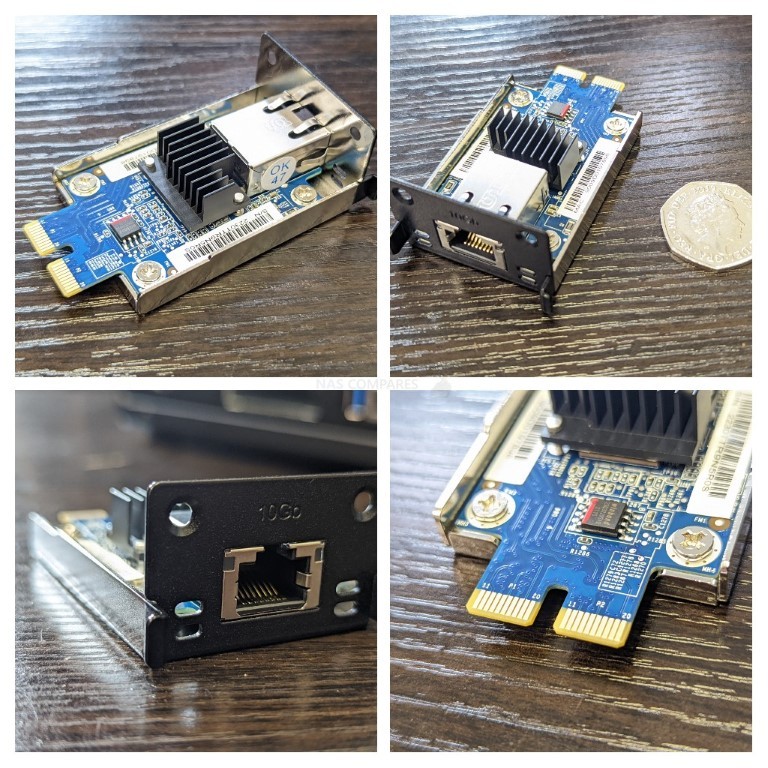
ECC Memory Type and Maximum Scalability of the DS723+
Another one of the expectations of the expandable 2-Bay diskstation hardware that the DS723+ goes ahead and smashes is in the area of Memory. Previous generations of this series have arrived with 2GB of Memory which can be upgraded to 6GB of memory (in some cases, with the initial 2GB of memory being soldered to the main controller board). The DS723+ NAS makes a couple of significant changes by providing the same amount of memory at 2GB (which is a little disappointing), BUT it can support upto 32GB of memory across two SODIMM slots! that is more than FIVE TIMES the maximum of any other system in the series’ history and that is going to allow ALOT of apps to stretch their muscles a bit with that much RAM to share out!
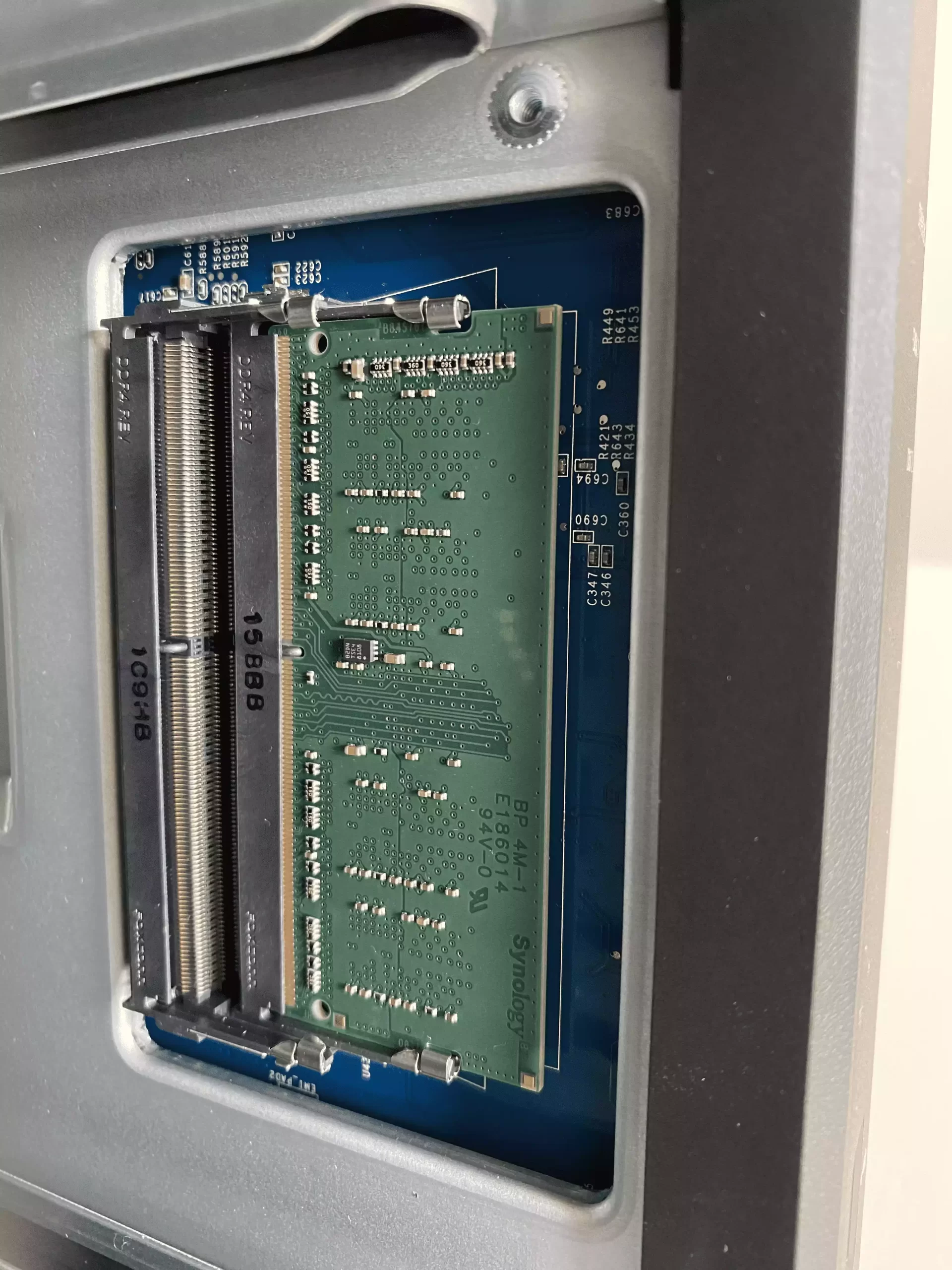
This memory in the DS723+ improves further on its predecessors by virtue of being ECC memory (Error Correcting Code), something that you would never ordinarily find on a 2 Bay system. ECC memory arrives with an extra memory chip per module on board that (in caveman terms) allows the system to have a blueprint of the data that is passing through the memory on the way to being written/sent to the disks and then, at the end of the memory processes, it is compared against the blueprint and if errors/inconsistencies are observed, the memory repairs the data. ECC has always been proven invaluable at the business level as it ensures data that has been stored on the NAS for warm or cold storage has no silent inconsistencies that down the line could result in invalid/corrupt data (e.g bitrot). Synology has been championing the use of ECC memory in their systems and slowly but surely, all of their product ranges in PLUS and above (i.e XS, SA, etc) are arriving with this enterprise-class memory by default.
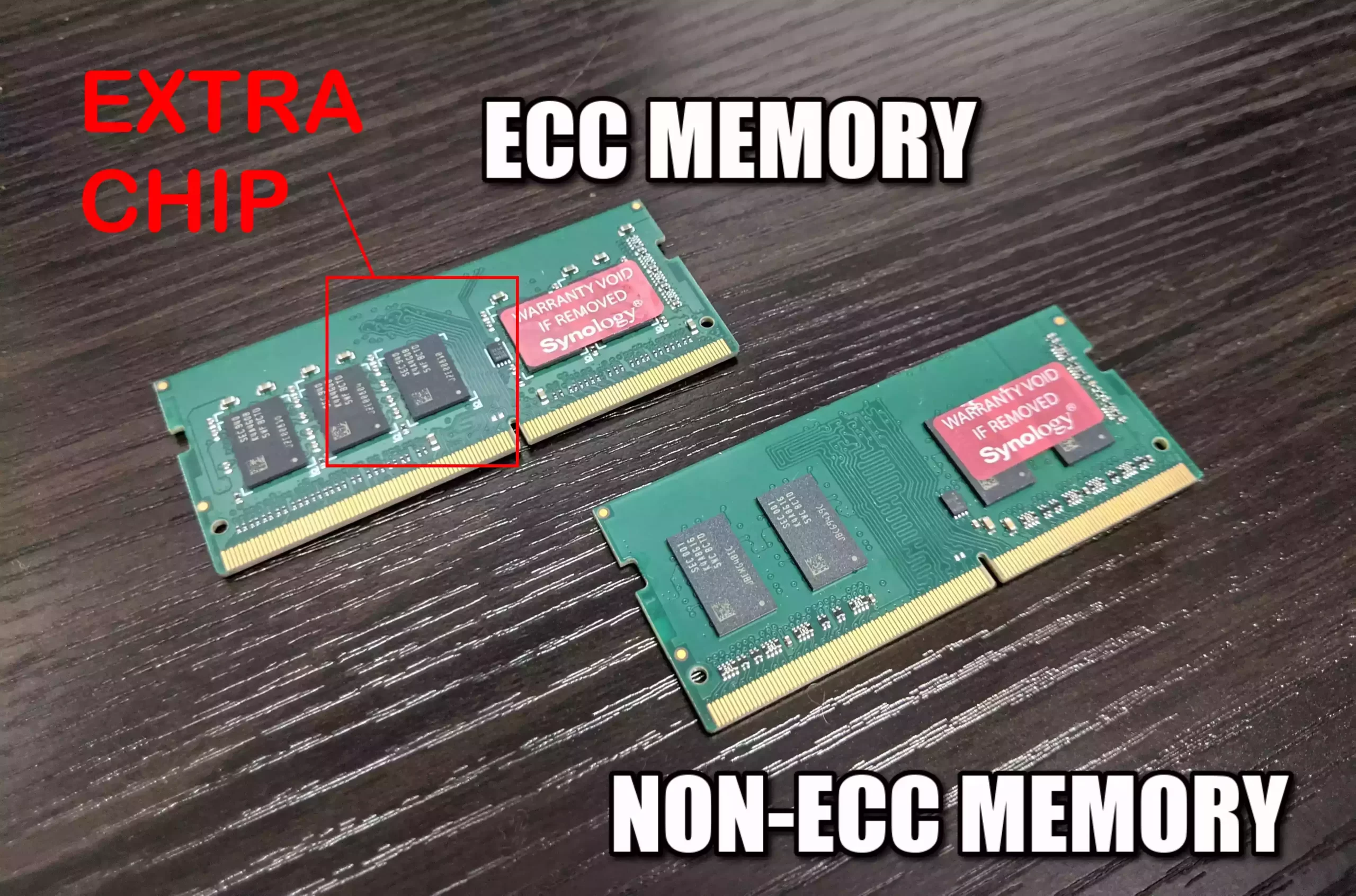
The DS723+ NAS featuring ECC memory DOES mean that official Synology memory upgrades are going to be more expensive, but the RRP of the DS723+ NAS (with the original 2GB of ECC Memory) already arrives at a very, very similar price point to its predecessor’s RRP when they were released, so any extra cost down the line is optional.
Low Noise, Small Power Use and Compact Design
This is a point that will appeal to a very specific % of NAS buyers, but the D723+ NAS arrives in the same 2-Bay Diskstation chassis as the DS720+ and DS718+ before it (with tweaks here or there), which was very low impact in it’s design. What I mean by that is that it is quite a compact casing that is very easy to deploy, very well-ventilated on almost all sides (even the official logos on either side are ventilation panels) and is surprisingly low noise when in operation. The DS723+ has a single rear active fan and is a low-noise fan too. The huge amount of ventilation that passes over the internal heatsinks (no internal CPU fans or a PSU fan, as that is external) is assisted by the copious ventilation and the result is a NAS that has had alot of time in R&D to balance between internal system temps in 24×7 operation AND having low ambient noise/space impact to the end user. HERE is my noise testing of the Synology DS920+ NAS (using a similar chassis, but in 2 bays) using different kinds of HDD and SSD media to show the noise levels that were hit.
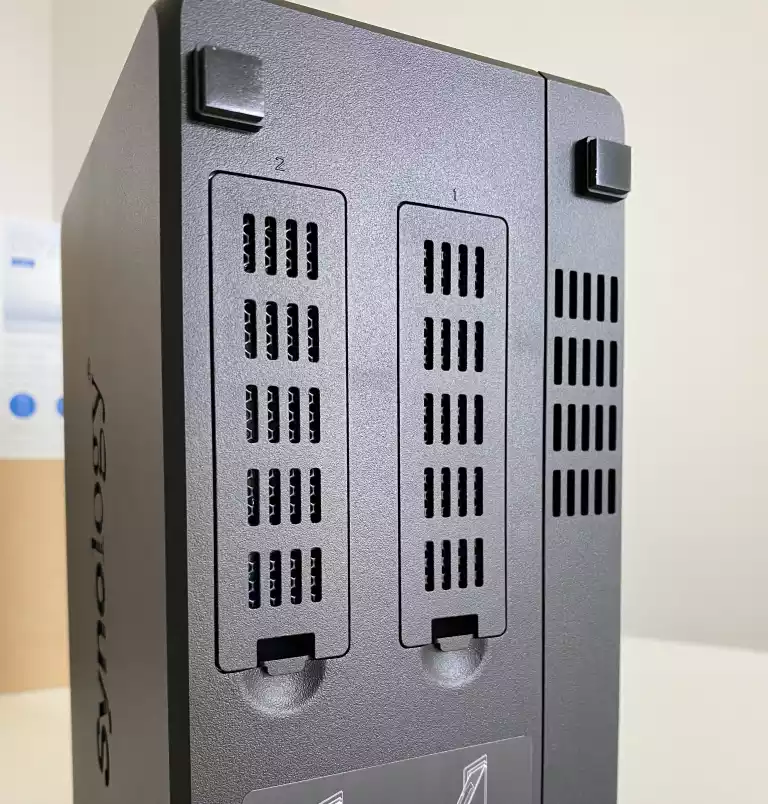 |
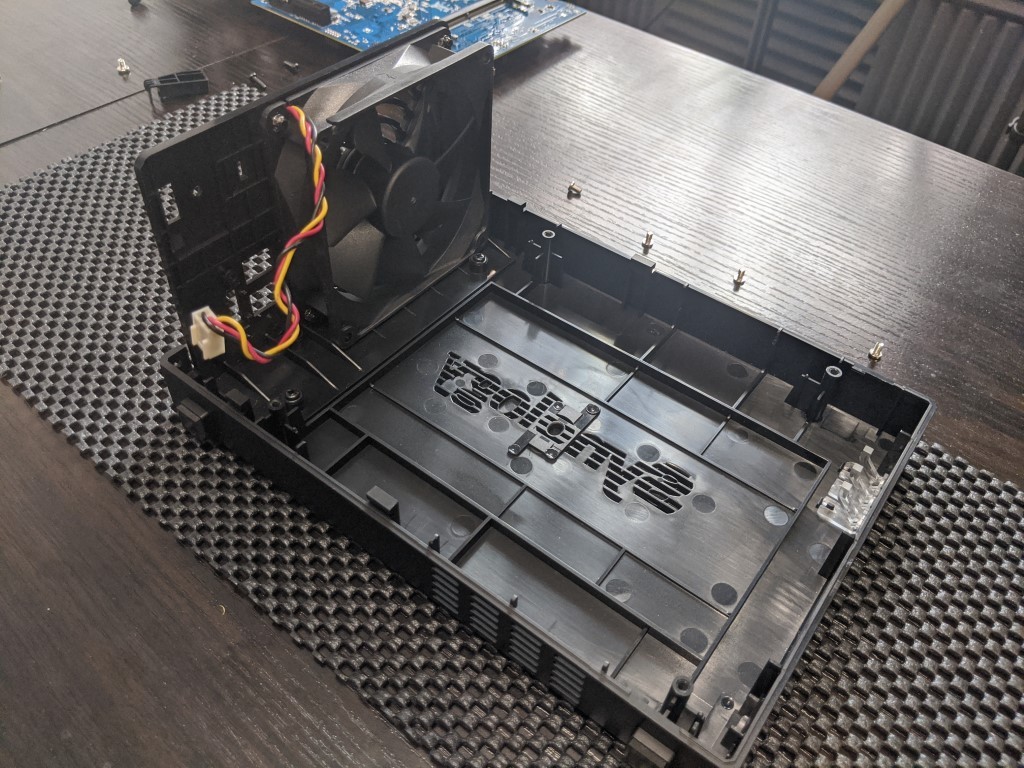 |
All that said, do keep in mind that the Hard Drives that you choose to use will make an impact on noise. Any NAS HDDs (WD Red or Seagate Ironwolf) of 8TB or lower capacity will be lovely and quiet (only really making noticeable noise in periods of high access frequency), but larger capacity HDDs or enterprise class/industrial built Hard Disks will make more ambient noise (vibration hum, clicks of the internal arm/actuator and spinning disk platters) and these will be easily noisier than the DS723+ noise when in operation.
FULL DSM 7.1 and DSM 7.2 Support
At Launch, the DS723+ NAS arrives with the latest version of Synology software, DSM 7.1. However, this does not stop evolving as soon as you get your Synology NAS. DSM has been in continues to be the dominant force in the world of NAS software, providing a massive arrangement of services, applications (first and third-party supported) and a huge number of client applications for desktop, mobile, Windows, macOS and Linux (as well as a bunch of other more home-based tools). These allow management and access to the data on the DS723+ in very tailored ways, as well as the web browser-based access that has the appearance, intuitive design and responsiveness of a local operating system. The DSM interface can be accessed by hundreds of users at the same time (with each user having tailored access, rights and privileges). DSM is available with ALL Synology NAS and the depth and abilities of DSM on any NAS are dependent on the hardware architecture of the NAS itself. In the case of the Synology DS723+, it supports EVERYTHING that is offered by Synology’s platform. DSM is currently in version 7.1, but soon we will see the DSM 7.2 software update, which will be adding WORM (write Once Read Many) support, Volume scale encryption and numerous improvements to individual applications. If you want to learn about it, you can read the DSM 7 Full Review HERE.
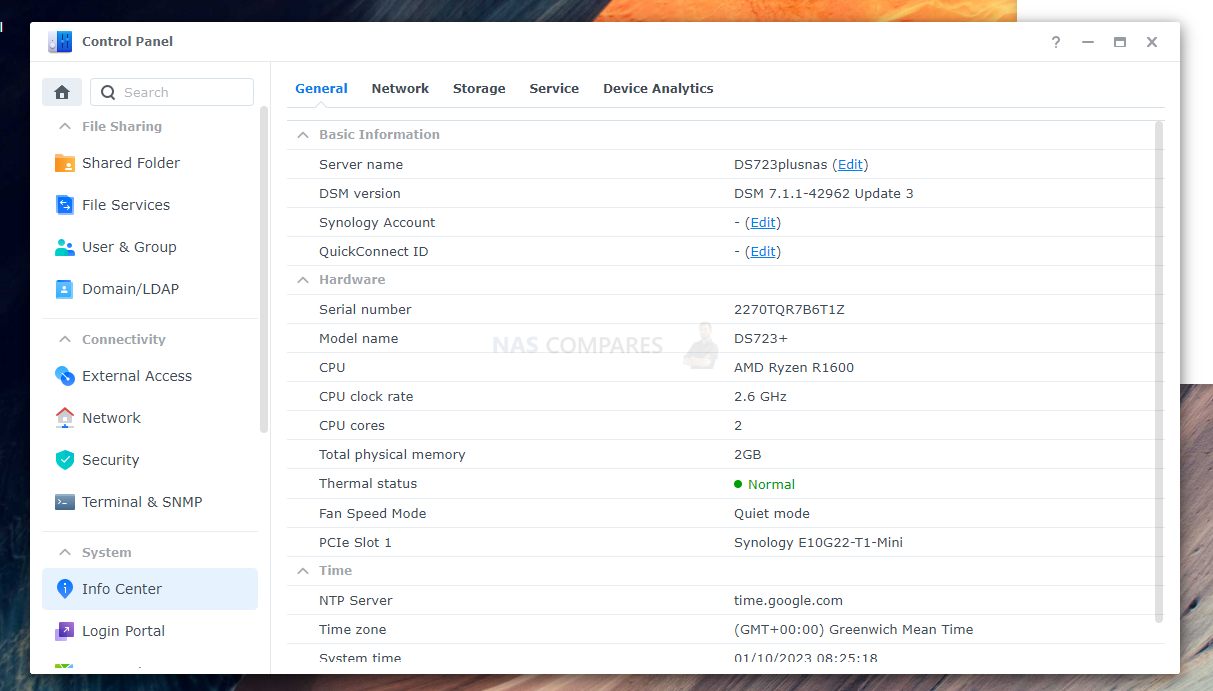
As mentioned, the DS723+ supports pretty much the entirety of the DSM 7.1 applications and services (DSM 7 and DSM 6.2 are still in circulation and still receive regular service and security updates, though the DS723+ will arrive with DSM 7.1 by default and cannot be rolled back). If you are an existing user of SaaS and PaaS (Software as a service and Platform as a service) from the likes of Google Workspace and Office 365, knowing that you can synchronize these systems or choose to export away from them onto the Synology services is going to be very appealing. Then there is the increasing development of their 1st party cloud platform, Synology C2, which is slowly integrating into all the applications that are available on your bare metal NAS (allowing you to add a cloud layer of backup, synchronization and access to your data storage setup). This is a subscription platform, which can only be used with your Synology NAS system (as well as connected with some 3rd party SaaS services, but for those that are moving away from Google/Microsoft/AWS for security reasons, but still want a Cloud+Metal storage network in place, C2 covers pretty much everything. Indeed, although below I have highlighted a number of the key/best applications that are included in your DS723+ Service with DSM, most of them can be immediately integrated with Synology C2 (with even more being added in 2023 with DSM 7.2). Key business and consumer applications that are included with your NAS are:
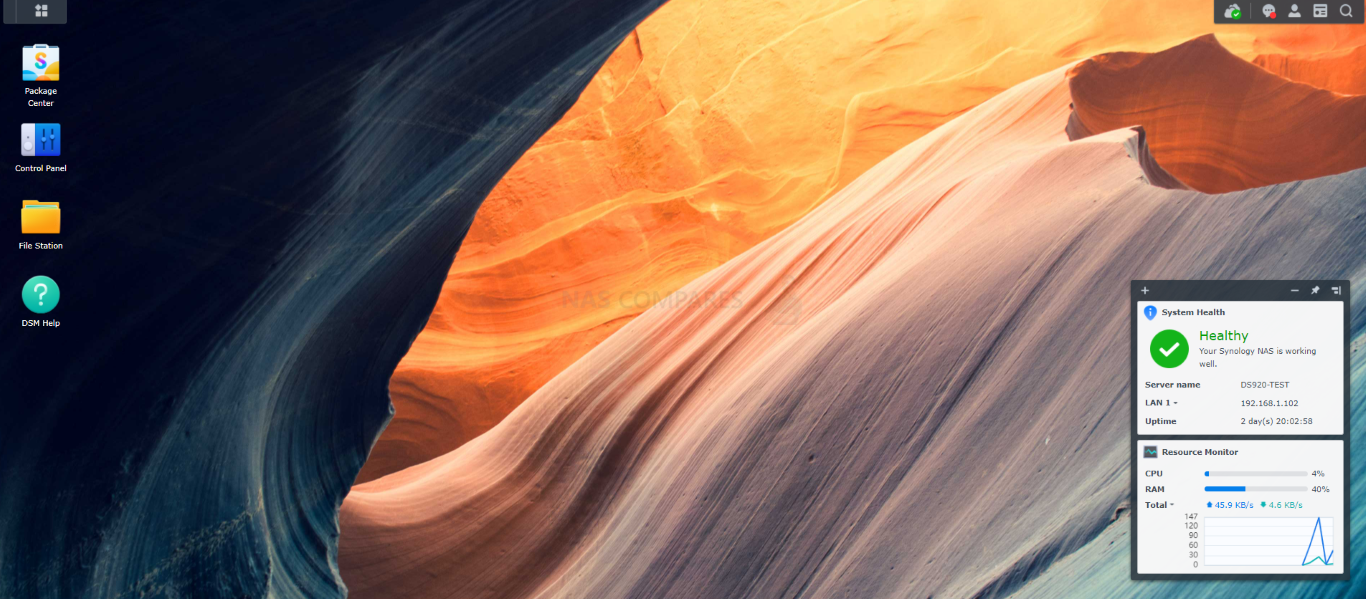
Synology Office – Create documents, spreadsheets, and slides in a multi-user environment. Real-time synchronization and saving make collaboration a breeze.
Synology Chat – Aimed at businesses, Synology Chat is an IM service that transforms the way users collaborate and communicate.
Synology Drive – Host your own private cloud behind the safety of your NAS with 100% data ownership and no subscription fees. Drive has become one of the premier applications of DSM and allows uses to create intelligent shared team folders that support versioning, file streaming+pinning, encryption, Windows AD support (soon) and native file system support with Windows and macOS.
Synology Photos – Manage your photos and videos with deep-learning algorithms that automatically group photos with similar faces, subjects, and places. Designed after the merger of Synology Photo Station and Moments, it also includes tailored folder, sharing and categorization features to help photographers manage their photos and share them with clients for feedback or business development.
Synology Calendar – Stay on track, share calendars, and schedule meetings, while ensuring sensitive information remains safely stored on company premises.
Synology Active Backup for Business (ABB) – Consolidate backup tasks for virtualized environments, physical servers, and personal computers, and rapidly restore files, entire machines, or VMs – license-free. This software also arrives as a specialised Microsoft Office 365 and Google Workspace platform to sync with those platforms and allow a bare metal tier to your cloud office services
Synology Hyper Backup – Backup your NAS safely and efficiently to multiple destinations with deduplication, integrity checks, compression, and versioning.
Synology Surveillance Station – Safeguard your business, home, and other valuable assets with reliable video surveillance tools. With improved AI services being accessible thanks to Synology BC500 and TC500 Cameras arriving in 2023. Additionally, you can connect this platform with Synology’s cloud platform to use ‘C2 Surveillance’ and bolster the odds of recordings being maintained in the event of accidental/malicious damage to your surveillance system.
Synology Virtual Machine Manager (VMM) – An intuitive hypervisor that supports Windows, Linux, and Virtual DSM virtual machines. Its powerful disaster recovery tools help users achieve maximum service uptime.
Synology High Availability – Synology High Availability (SHA) combines two Synology NAS servers into one active-passive high-availability cluster, alleviating service disruptions while mirroring data.
Synology Central Management System (CMS) – Synology CMS allows you to manage multiple Synology NAS servers quickly and conveniently from a single location.
Synology Video Station – Manage all your movies, TV shows, and home videos. Stream them to multiple devices or share them with friends and family.
Synology Audio Station – Manage your music collection, create personal playlists, stream them to your own devices, or share with family or friends.
Synology File Station – Manage your Synology NAS files remotely through web browsers or mobile devices. This tool allows complete file management and contains all the features and services of your own native file management platform (archiving, extracting, Copy, Cut, Paste, Sharing, native file format opening, integration with the rest of the Synology applications, property/metadata access, etc)
You cannot really fault the software and services that are included with the Synology DS723+ NAS, as you are going to get the very best experience available on the platform, thanks to the hardware and architecture of this NAS. DSM 7 is an ever-evolving platform, so if you are reading this now at the time of publishing or years later, there is always going to be something in DSM for everyone. That said, Synology in recent years has been increasing its priorities towards first-party software and services. This does make sense, as they want to promote their systems and software as a complete ecosystem for your home or business data storage needs (going on in the last few years to release even more Synology alternatives to popular software AND releasing non-NAS hardware accessories such as Routers, Network Adapters, HDDs, SSDs and now IP Cameras). This can occasionally lead to the compatibility lists of hardware or software that you wish to use in conjunction with the DS723+ NAS being a little smaller/restricted than you might like. A specific 3rd party software/service or physical accessory (HDD, Memory module, Network Upgrade) might not appear on the Synology compatibility pages, but that does not mean it will not function with the DS723+ NAS. It is more a case of Synology choosing not to test/evaluate a particular setup (in their defence, there are ALOT) and therefore until stated otherwise is therefore listed as incompatible and is therefore being used without their full, guaranteed support long term. In short, you can DEFINITELY feel that DSM 7/7.1 is a fantastic NAS platform, but it comes with a certain degree of rigidity by Synology on the DS723+ NAS. A little more relaxed than entries in the Enterprise XS or SA systems, but it is definitely still there.
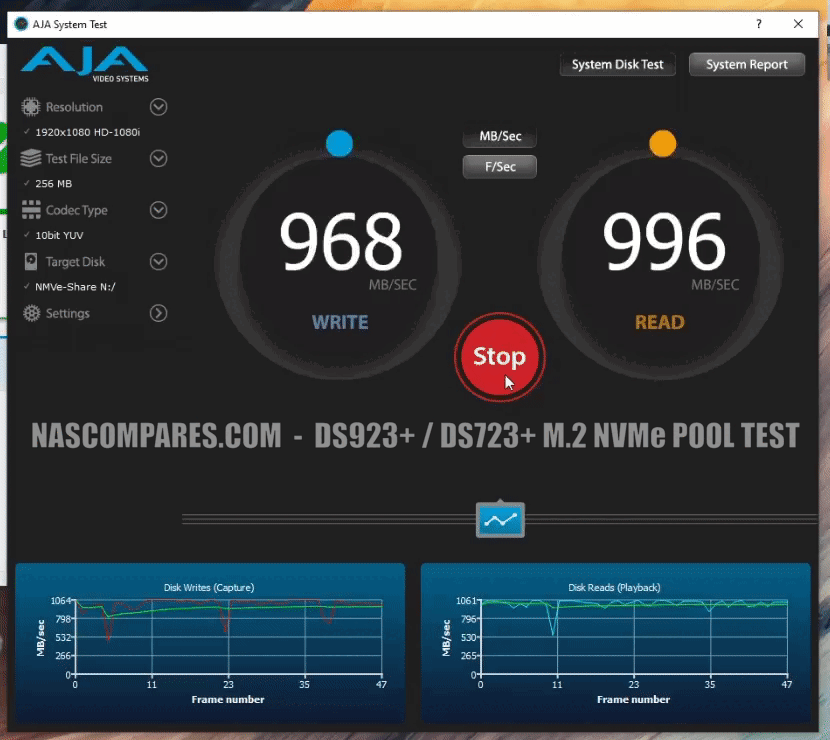
PCIe Gen 3 M.2 SSD Support and the Future of Synology Storage
Another development from Synology very recently that the DS723+ NAS benefits from is the support of M.2 NVMe SSDs as Storage Pools – something that has been demanded by new/old Synology NAS users alike for YEARS! Synology was one of the first (if not, THE first) to introduce M.2 NVMe SSD bays on to desktop 2/4-Bay NAS systems way back in 2017/18, but restricted their use for caching only (read/write). It has only been now with the release of the Synology DS923+ and DS723+ that the brand has become a little more flexible and allowed users the choice to use these much, MUCH faster (and so much, MUCH more expensive) types of storage media to be used as storage pools and volumes. With M.2 NVMe SSDs arriving with thousands of MBs of throughput (compared with the rather limiting 250-270MB/s maximum of modern high-end HDDs), this feature also effectively turns the DS723+ 2-Bay into a 4-Bay NAS system.
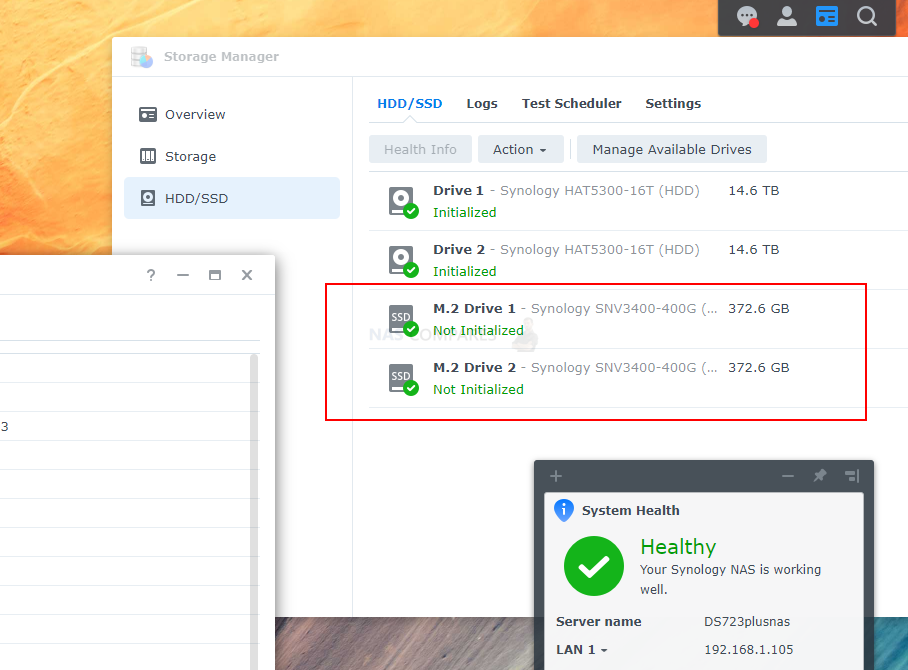
It is also worthing keeping in mind that you technically do not need to actually make a choice between these M.2 NVMe SSD Bays as storage pools. This is because the system has two 2280 M.2 NVMe bays and you can opt to use one SSD for a storage pool (for your higher performance needs in databases, VMs, etc) and the other can still be assigned as a read cache drive in it’s own group, which can be assigned to the HDD or SSD storage pools if you choose. Currently, Synology DSM 7.1 does not support ‘write only cache pools’, but I can definitely see this as a feature in future DSM updates, as it is an often requested feature.
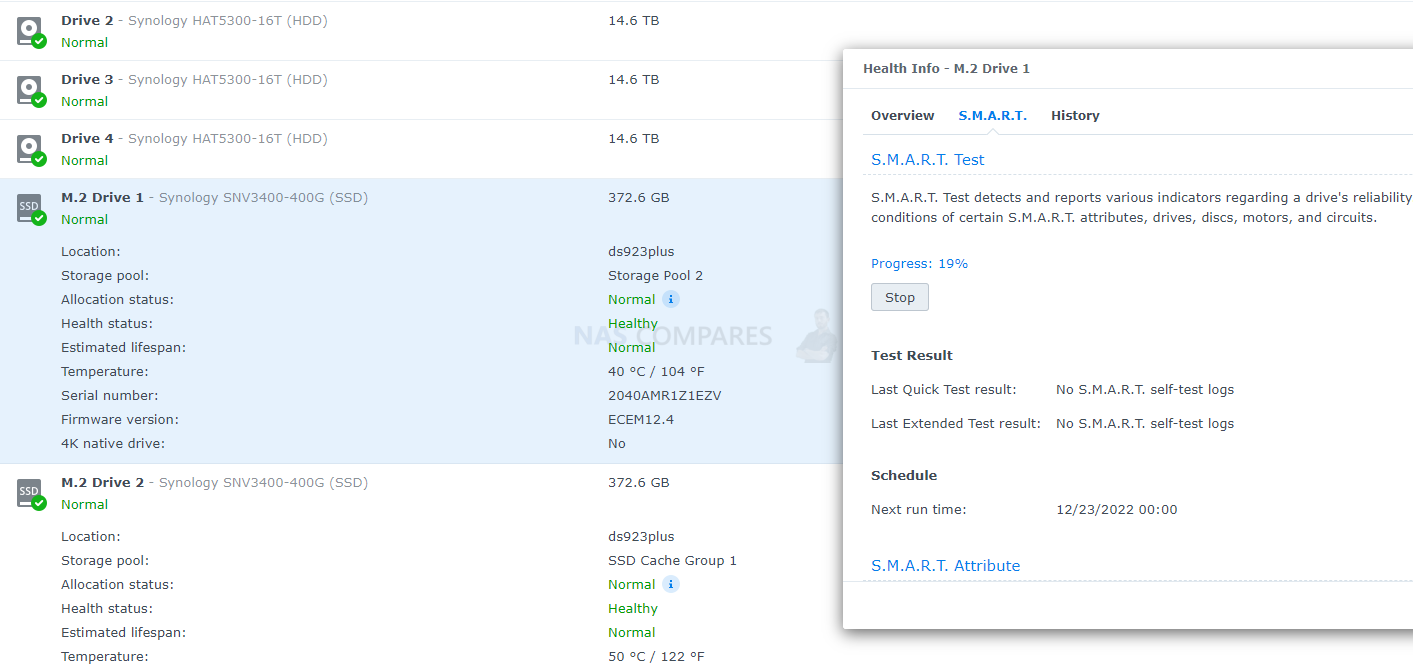
Once you have made a storage pool using 1 or 2 M.2 NVMes, this area of storage can be used just the same as the HDD equivalent in DSM. It can be used as the target storage for individual applications, as the primary storage area for VM or Container deployment, as the location of multiple iSCSI LUNS and Shared Folders and just pretty much anything. For those users looking to take advantage of the external 10GbE network upgrade option for Photo/Video editing, the use of M.2 NVMe SSD storage pools for this is going to be substantially better than the performance that the two SATA HDD/SSD bays could have ever reached.
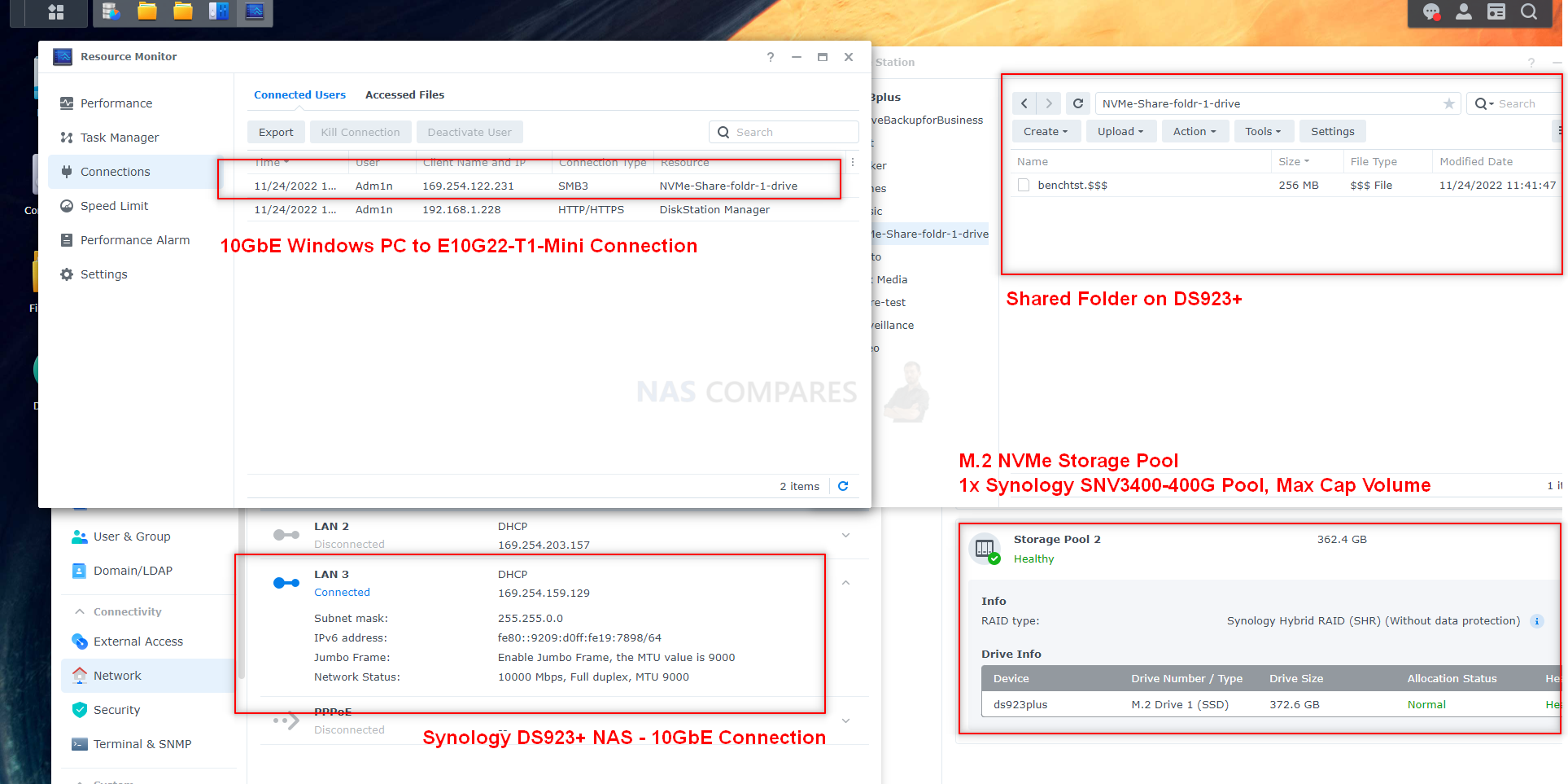
Nevertheless, it is still great to finally have the support of M.2 NVMe SSDs as storage pools in a Synology NAS, especially when you roll in that optional support of 10GbE. It’s worth highlighting though that, as this feature has only JUST been added to DSM on the DS723+/DS923+ NAS, it arrives with a few limitations at this time (ones we assume/hope will change in future DSM 7.2 and above updates). For a start, you cannot initialize the DS723+ and install DSM on the M.2 NVMes as a boot drive. If you try to boot the DS723+ first time without any HDDs installed, but with the 2x M.2 NVMe Bays populated, the system will not recognize them as suitable for initializing DSM on the NAS. See below:
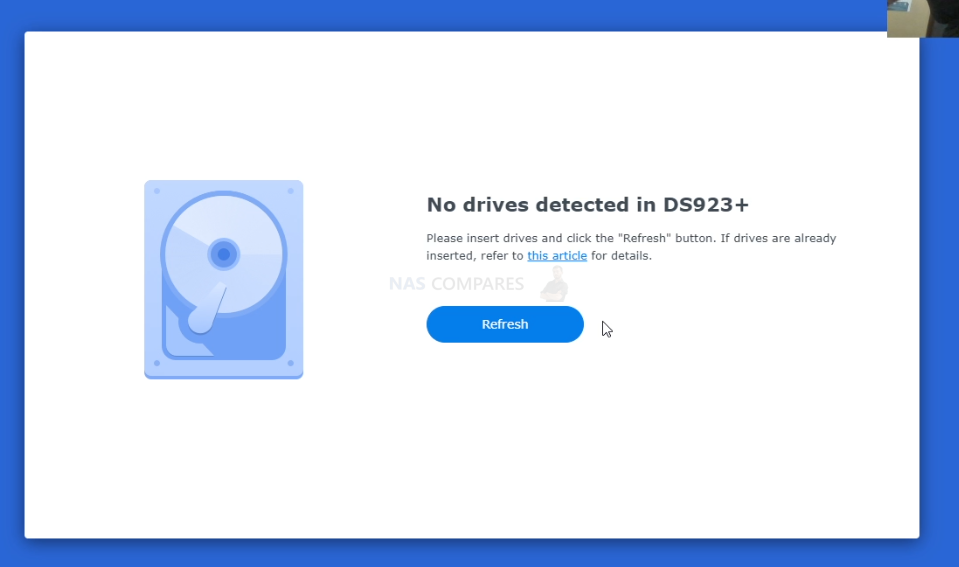
Reasons You SHOULD NOT Buy the Synology DS723+ NAS
Of course, though, the Synology DS723+ NAS is not going to be everyone’s cup of tea. It is fair to say that there are some elements in this follow-up to the 2.5yr old DS720+ that have rubbed a few users up the wrong way. Let’s discuss the five reasons why the DS723+ NAS (and indeed a Synology system in some cases) might not be the ideal private server solution for you.
The CPU in the DS723+ is a little divisive
The CPU inside the DS723+ is the AMD Embedded Ryzen R1600 processor, an x86 64bit Dual core, four-thread processor with an impressive base level clock speed of 2.6Ghz that can be scaled up to 3.1Ghz when needed. Now, the DS7xx+ series has always arrived with a Quad Core Intel Celeron (or Pentium) processor in the past and when it was revealed that the DS723+ was arriving with a dual-core embedded ryzen, many users were a little unhappy. This was largely down to two factors. The first was that the R1600 is a dual-core, not the four-core that everyone expected. Now the R1600’s four-thread architecture does allow the CPU to spread out quite alot across tasks and services (as well as virtual CPUs in VM deployment), as well as having a higher power in both base and burst mode available, which means it isn’t a bad CPU! But the bigger area of contention from some buyers is that the R1600 lacks integrated graphics. This means that for some tasks and services that are more graphical in nature, the result will be a higher typical CPU Uages % than a processor that has a more specialized graphics management component onboard.
How the Synology DS720+ Intel Celeron J4125 and DS723+ AMD Emb.Ryzen R1600 Compare:
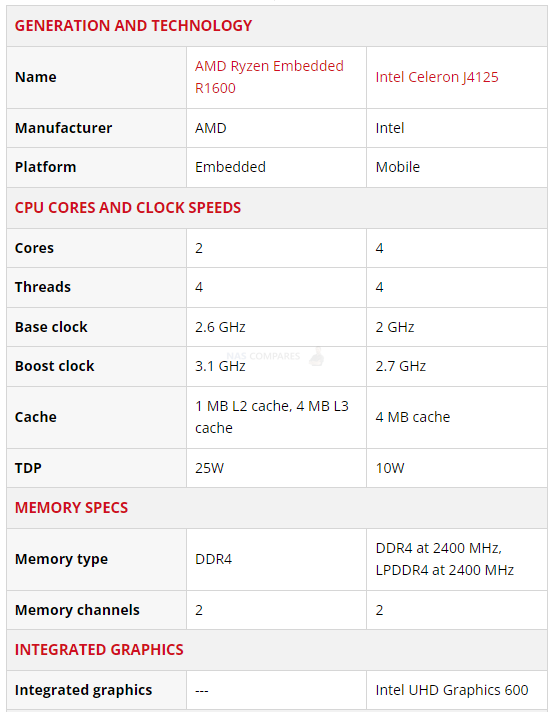
The traditional data handling of the R1600 is very good, as seen in our DS1522+ testing earlier in 2022. As far as DSM (the Synology software) is concerned it will be able to run EVERYTHING! Additionally, the general file handling and throughput internally are going to be great too, so all good news. Then you have the advantage of the newer gen CPU in the DS723+ over the DS720+ supporting PCIe3 lanes, affording greater bandwidth to the rest of the hardware (i.e those M.2 slots being higher bandwidth and enabling that network upgrade slot), all the while with the CPU having the potential to hit 3.1Ghz of power when needed. It is genuinely a good CPU and there are lots of reasons why Synology have opted for this CPU, but it is by no means perfect and some specific user setups and their concerns do have merit.
For a start, the AMD R1600 has a higher typical usage (unsurprising for the spec and generally identified as TDP, as a maximum) compared with the avg Intel Celeron being used in other NAS systems released in 2022 (such as the Intel N5105 or J6412) and in a system that will be in operation 24×7, this is going to a question mark for those affected by erratically rising energy prices right now, The difference might only be pence on the day, but those pence add up! Then there is the dual cores. Although having the four threads IS handy and will be useful, Cores will always beat threads when it comes to capabilities.
The DS723+ arrives with 1GbE By Default
Those ethernet ports. The default model of the DS723+ NAS arrives with two one gigabit ethernet ports (the same as the DS720+, DS718+ and DS716+ before it), despite almost other commercial NAS brands producing solutions at this consumer-tier/scale arriving with at least 2.5GbE. Now, the adoption of greater than gigabit connectivity in client hardware (laptops, PCs, routers, switches, docking stations, etc) is by no means as ubiquitous as 1GbE (which has been around for decades at this point), BUT it is growing. ISPs are providing fiber internet connections globally that exceed gigabit speeds, along with 2.5GbE and WiFi 6 routers. We are seeing more prosumer switches, routers and PCs with default 2.5Gb network ports (at the same/similar cost as 1GbE), $20 USB-to-2.5G adapters and even the affordability of 10GbE on some client devices has allowed users to gradually scale up their hardware environment. The fact the DS723+ arrives at the tail end of 2023 and does not feature greater than 1GbE ports by default is quite damning. Even if you have no plans for 2.5G right now in your setup and think it something of a fad (favouring 10GbE), in terms of future-proofing and the general standard or networking hardware right now, gigabit ethernet is a surprising weakness here.
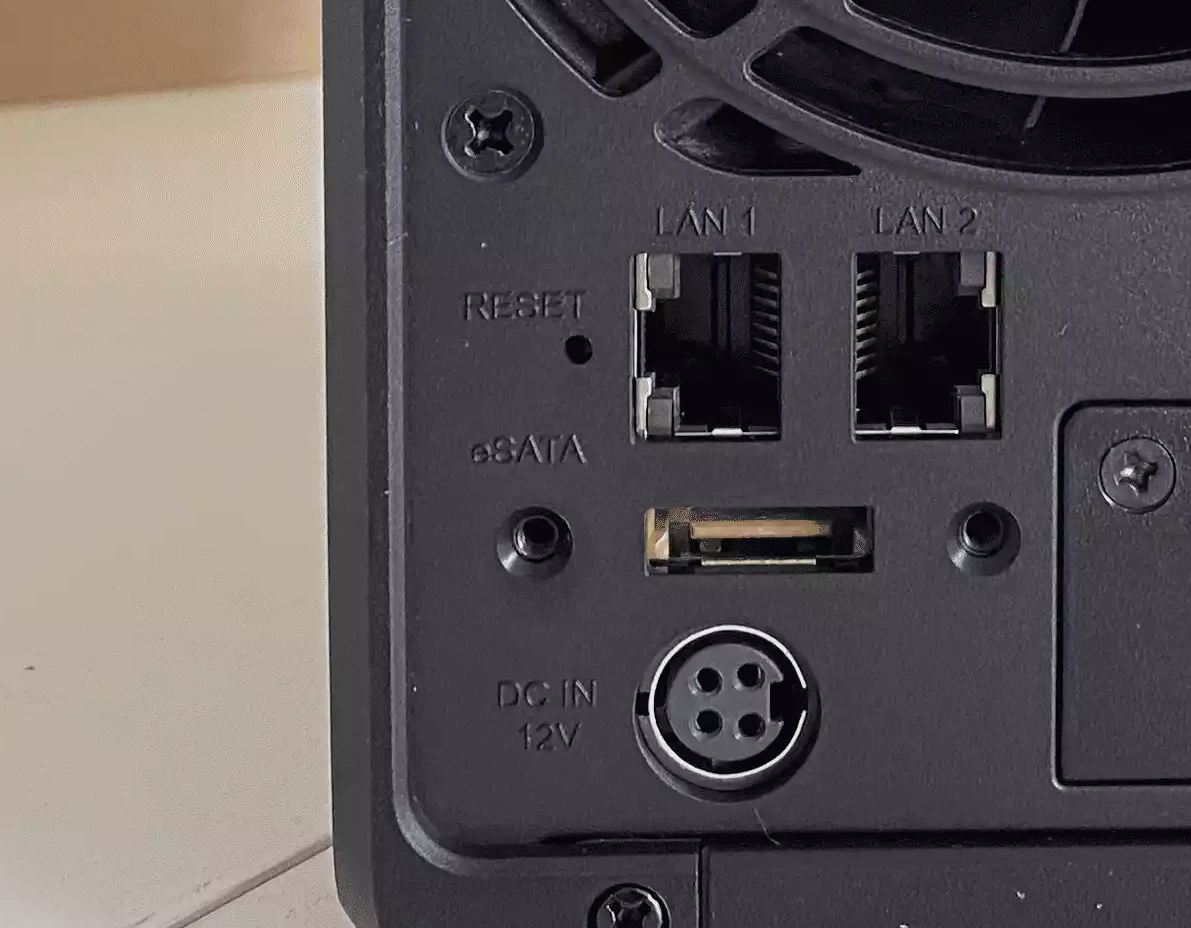
Only One USB Port and It’s Functionality and Support on the DS723+ is Underwhelming
This is going to sound fantastically churlish, however when looking at a smaller scale NAS system, the importance of external connectivity (backups, migration of data, etc) grows in importance. The DS723+ arrives with just one USB Port and it is USB 3.2 Gen 1, so 5Gb/s (500-500MB/s max bandwidth). Much like the 2.5G vs 1Gb complaints I made earlier, most other NAS brands at this hardware tier have rolled in USB 3.2 Gen 2 (10G / 1,000+ MB) ports, as well as USB-C in some cases, with minimum 2-3 ports (often 4). With the ease with which a user can add a USB tier to their 3-2-1 backup strategy (allowing them to be a little more financially creative with a network/remote/cloud backup tier as well), the slightly old skool single USB port here is a little underwhelming. With significantly more affordable RAID-enabled USB solutions in the market and/or M.2 NVMe external USB drives arriving affordable to comfortably provide faster external storage for backups, this seems like a bit of a misstep by Synology to ignore. in such a small scale system.
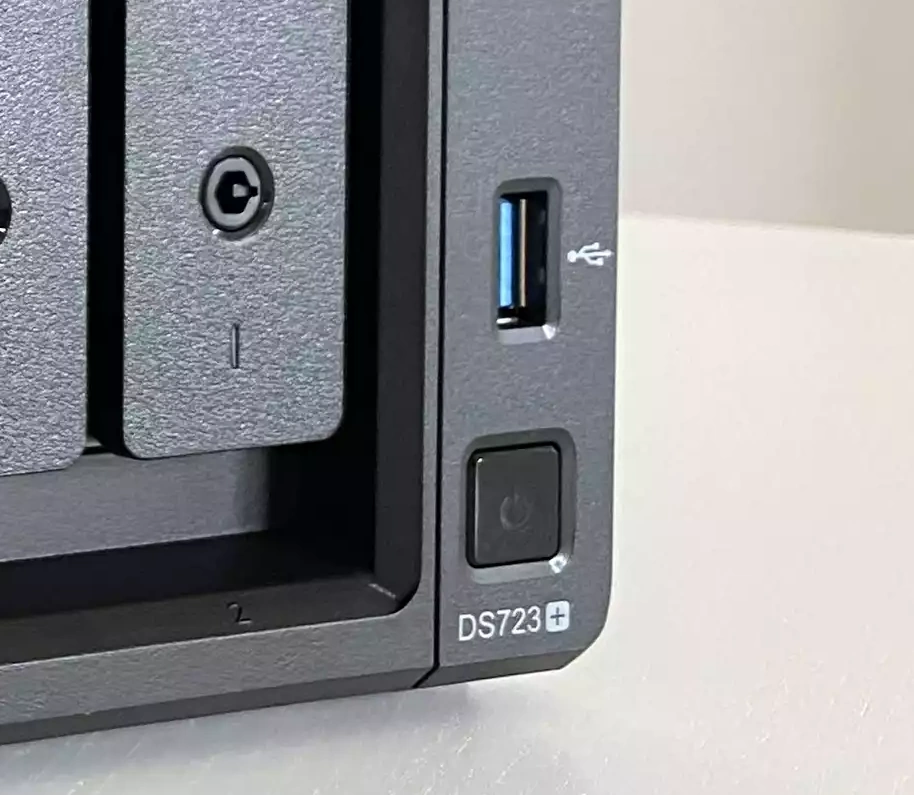
Also, DSM 7 and DSM 7.1 (with DSM 7.2 coming soon enough) have reduced the range of use of the USB ports of Synology NAS systems (removing many network adapters, DTV tuners, wireless dongles, office accessories such as printers, scanners and optical drives), and limiting them largely to storage, UPS’ and assigning them to VMs. I am sure Synology has done the market research and observed reduced utilization of USB on their systems to dictate this decision, but it seems to be another move by the brand to prioritize network/remote access only with their systems.
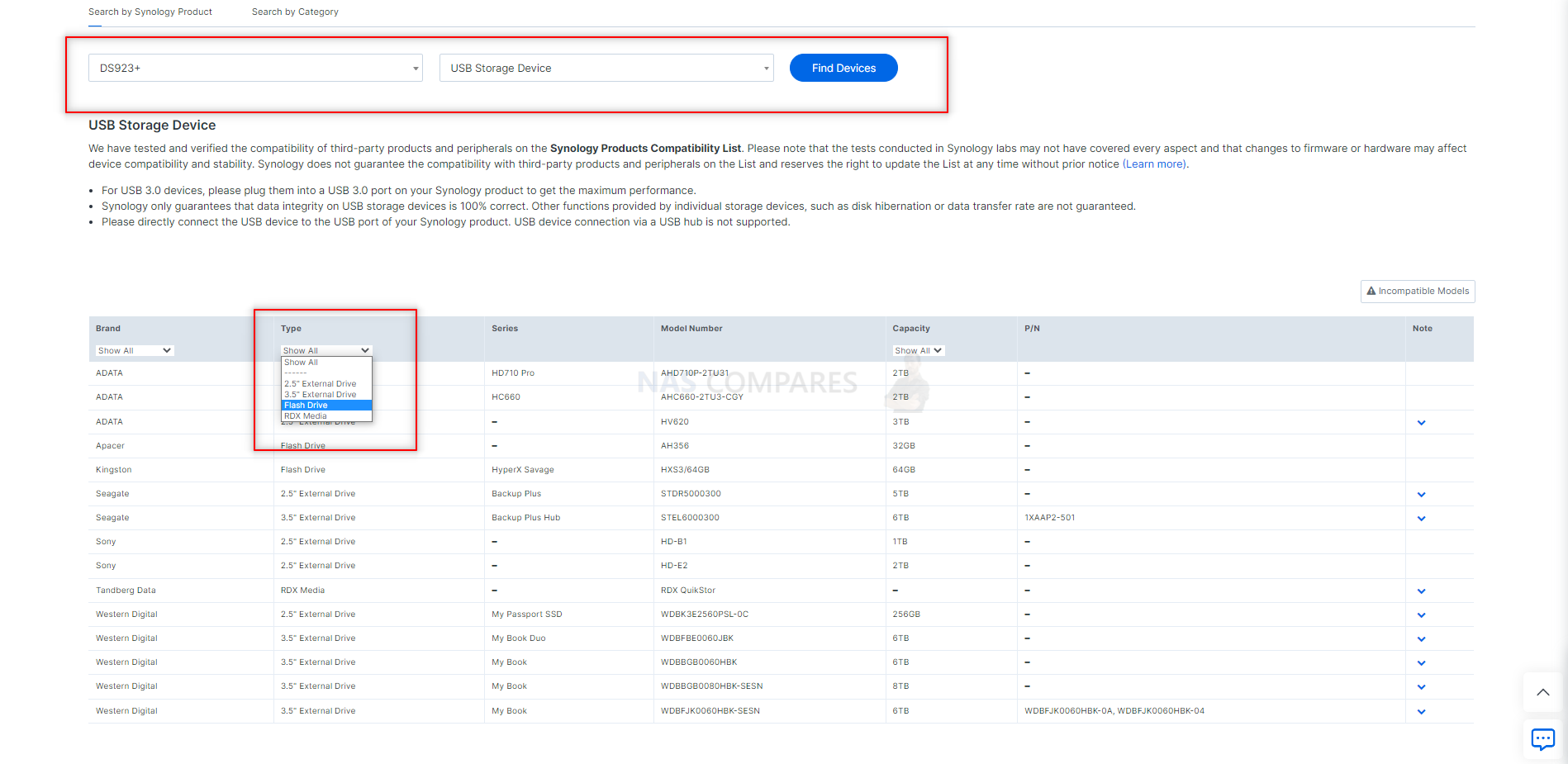
M.2 NVMe SSD Storage Pools ONLY Support Synology SSDs and are Currently Limited to Gen 3×1
Now, I have listed this as a ‘con’ and/or ‘reason to not buy the DS723+ NAS’, but really this could well be a positive for many business NAS buyers or those that want a much easier system to manage, upgrade – especially those who do not have much technical knowledge and/or an in-house IT admin. Over the last 4-5 years we have seen Synology become increasingly focused on it’s own first-party hardware and services. This is not uncommon (it would be weird if they didn’t invest heavily in developing their platform!), but many have highlighted that this has been to the detriment of it’s support of popular/common 3rd party hardware and software. Synology is increasingly becoming a ‘one-ecosystem’ platform (again, not necessarily a bad thing) that wants to provide a COMPLETE solution for a users network and data storage needs. DSM still supports a large number of 3rd party business services and platforms (SaaS and PaaS once, such as Office 365, Google Workspace, Hyper-V + VMware to name just a few) AND home/homelab ones like Plex, Docker, Emby etc. This first party priority also applied to their M.2 NVMe SSD Storage Pool support, as (see gif below) at the time of writing, you can only use Synology’s own first-party M.2 NVMes for storage pools. If you choose to install alternative drives in this bay from the likes of WD, Kingston or Seagate, the result is that the system will state that it cannot proceed, highlighting that the drive is not tested by Synology for this purpose. You can still use the SSDs for M.2 NVMe SSD caching, but right now the storage pool feature appears to only be for Synology SNV3400 and SNV3410 Drives.
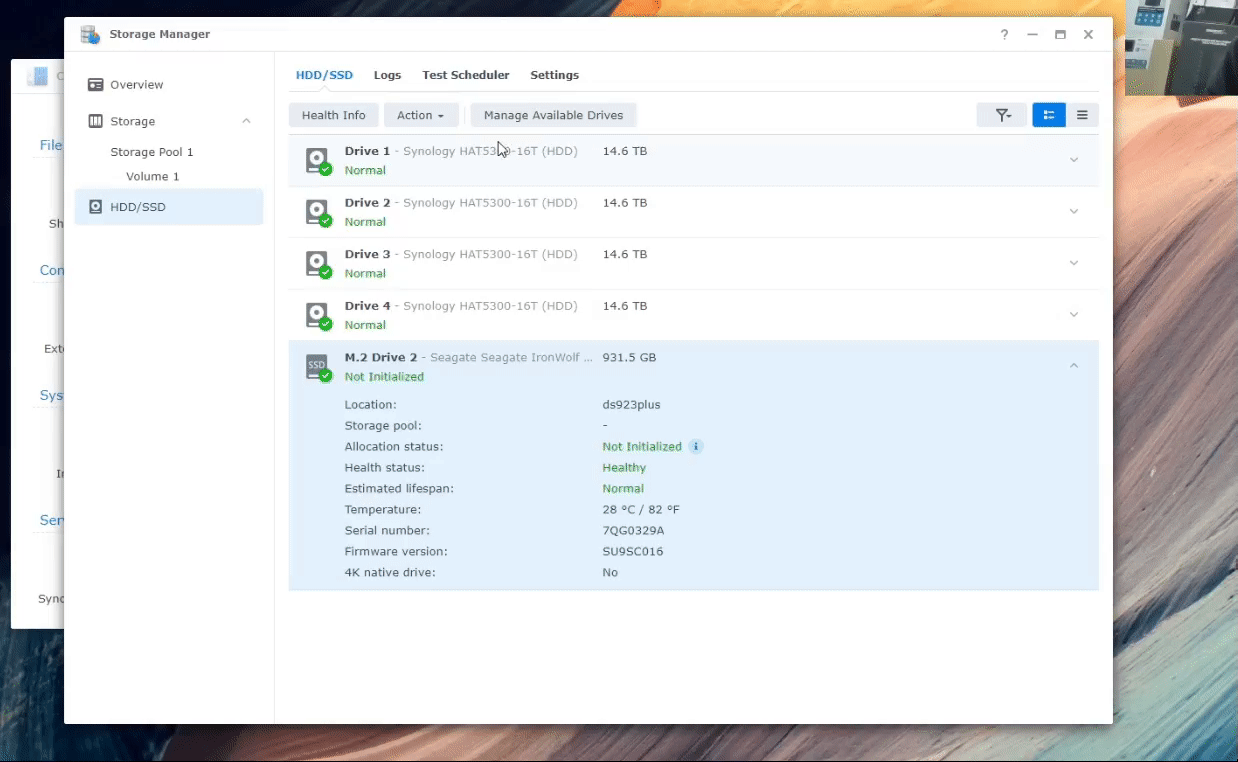
Another thing that was observed (first in the DS923+) was that although these are physically PCIe Gen 3×4 Bays (checked using Putty over SSH), they have been throttled to PCIe Gen 3×1. Now, there are several reasons for this move (appearing online from 1st/3rd party sources, as well as in communication with the brand previously) with the most recurring reason being to do with increased heat from these bays needing to be avoided. Now, though this may have merit and Synology will have little reason to do this otherwise, other NAS brands offering m.2 NVMe SSD Storage pools on their systems have not included this downgrade in PCIe speed for similar reasoning (though many use processors that lack the PCI Lane coverage afforded to the DS723+ and the Ryzen, meaning fixed 3×2 or 3×1 speeds for reasons of architecture, not heat). Its a slightly odd move and one that is also further baffling when it was confirmed that the support of M.2 NVMe SSD pools on previous Synology Diskstation releases with support of these 2280 slots (DS920+, DS1621+xs+, DS1821+ etc just to name a few) is not coming any time soon. It is still better to have support of M.2 NVMe SSD pools rather than not, but this has been a slightly odd way of approaching the feature and hopefully one that will see revision and improvement in further software/hardware updates in 2023/2024.
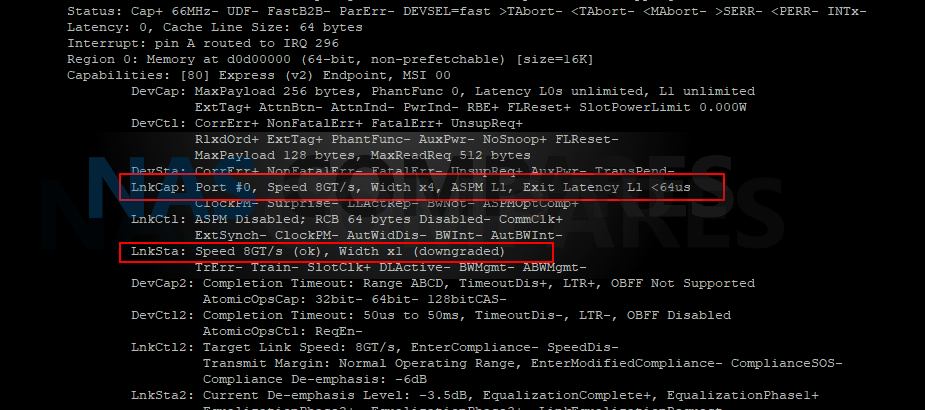
Server Side HEVC/H.265 Support and Conversions on the DS723+ are Weak
Finally, there is a lack of integrated graphics. Most users will not notice this as an issue in day-to-day use, but multimedia users and especially a large % of Plex users will notice, if they are a little more reliant on the server-side processing than on the client. For example, if your media collection contains alot of dense/complex audio media (RAW, MP4a, etc) OR alot of higher-end HEVC/H.265 Media BUT you do not have client hardware that supports these types (or allows local client conversions/transcoding), then the NAS will have to use raw horsepower to get the job done – much less efficient than embedded graphics doing the job. Again, you might not be impacted by this (your client hardware might have enough power and privileges, or you own a local HEVC-licensed device), but it IS a concern if you are running a Plex Media Server on the DS723+ and need the NAS to convert files on the fly. Earlier in 2022, I compared the DS920+ (with a Celeron) vs the DS1522+ (with this same AMD R1600) in a detailed YouTube video testing 4K Media in Plex. Here are the results:
Synology DS723+ NAS Review – Conclusion & Verdict
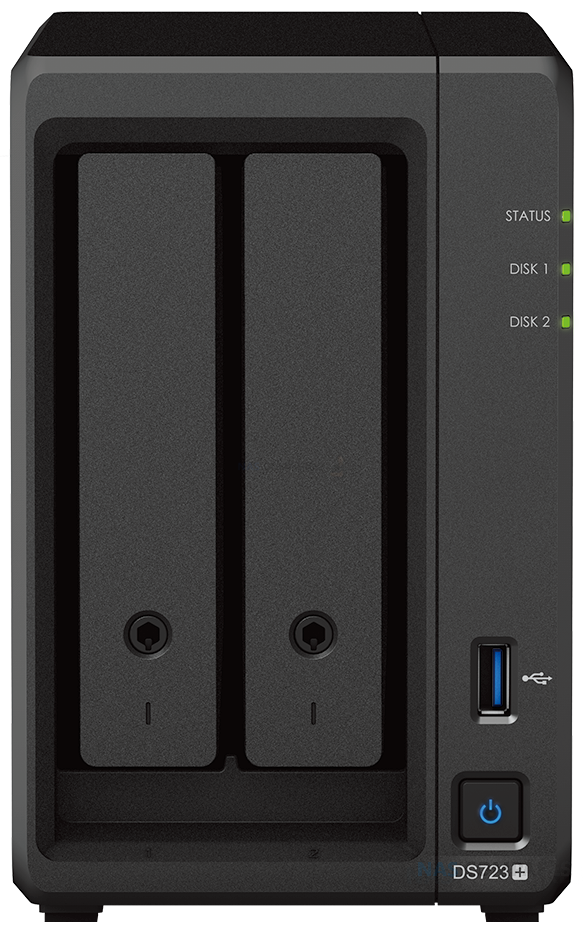
(FULL Review from 11/01/22 Can Be Found HERE) – There is no denying that the Synology DS723+ NAS is the most powerful, capable and upgradable 2-Bay that Synology has EVER released. Although the AMD Ryzen dual core Ryzen CPU is going to be a sticking point for those who wish a quad-core and/or integrated graphics CPU had been used (eg video conversions server side in Plex and the like) – the capabilities of the DS723+ NAS in it’s traditional performance, handling and throughput are better than they have ever been on ANY other Synology 2-Bay before. The 10GbE optional upgrade on this system is a very welcome but surprisingly option on this device (given Synology’s past reluctance to prove this on a system that may well struggle to saturate it with just two bays). Then there is the support of M.2 NVMe SSD storage pools, making the DS723+ NAS just the 2nd every Synology NAS to support this function (alongside SSD cache support of course) – though odd decisions on Gen 3×4>3×1 handling are still a touch puzzling. Support of DSM 7.1 (DSM 7.2 beta soon, at time of writing) runs beautifully on the DS723+ NAS and is still clearly what the primary selling point of this system is, with Synology offering the system as a solution and entry point into their ecosystem, rather than a hardware/nuts-and-bolts purchase. The full range of 1st party tools (Active backup, VMM, Photos, Drive, Collaboration Suite, Hyper Backup, Surveillance Station and more) still continue to impress and to have full and (mostly) licence-free access to these from such a compact server system is genuinely fantastic. Likewise, the support of 3rd party client applications and SaaS/PaaS services (Google WorkSpace, Office 365, VMware, Hyper-V, etc) still maintains a high standard of integration with the Synology tools, though with a clear growing movement by the brand to prioritize it’s own services.
Still, there is a lingering feeling that the DS723+ NAS in it’s default state is crying for a defacto day one upgrade. The 2GB of base memory seems rather penny-pinching, despite the support of ECC. The 10GbE upgrade option is welcome, but largely inevitable when the default connection are 1GBe – IN 2023! I return to my point at the intro, where there DS723+ arrives (at least in terms of hardware) as practically half of the DS923+ (half the bays, half the memory, half the USBs, etc), but with a pricepoint that is certainly not half. Therefore in many ways, the DS723+ NAS serves as a compelling argument to just skip it entirely and go for the DS923+ for about £200 more and enjoy those extras and partially populate. The support and compatibility of 3rd party hardware on the DS723+ NAS is a fraction more streamlined than some might like (eg 22TB and 20TB HDDs still remain absent on the compatibility list, yet Synology branded 18TB drives are clearly available and we absent upto that point despite WD and Seagate NAS alternatives in the market), but overall the DS723+ is still a great NAS and easily cements itself as the best 2 bay offering by the brand in their 20+ year history.
Where to Buy a Product





![]()
![]()

VISIT RETAILER ➤






![]()
![]()

VISIT RETAILER ➤
Need More Help Choosing the right NAS?
Choosing the right data storage solution for your needs can be very intimidating and it’s never too late to ask for help. With options ranging from NAS to DAS, Thunderbolt to SAS and connecting everything up so you can access all your lovely data at the touch of a button can be a lot simpler than you think. If you want some tips, guidance or help with everything from compatibility to suitability of a solution for you, why not drop me a message below and I will get back to you as soon as possible with what you should go for, its suitability and the best place to get it. This service is designed without profit in mind and in order to help you with your data storage needs, so I will try to answer your questions as soon as possible.
We pool the comments on this article and the videos that are featured in it to keep all the relevant comments in one place, so take a look and see if your POV is the same as everyone else’s.
📧 SUBSCRIBE TO OUR NEWSLETTER 🔔
🔒 Join Inner Circle
Get an alert every time something gets added to this specific article!
This description contains links to Amazon. These links will take you to some of the products mentioned in today's content. As an Amazon Associate, I earn from qualifying purchases. Visit the NASCompares Deal Finder to find the best place to buy this device in your region, based on Service, Support and Reputation - Just Search for your NAS Drive in the Box Below
Need Advice on Data Storage from an Expert?
Finally, for free advice about your setup, just leave a message in the comments below here at NASCompares.com and we will get back to you. Need Help?
Where possible (and where appropriate) please provide as much information about your requirements, as then I can arrange the best answer and solution to your needs. Do not worry about your e-mail address being required, it will NOT be used in a mailing list and will NOT be used in any way other than to respond to your enquiry.
Need Help?
Where possible (and where appropriate) please provide as much information about your requirements, as then I can arrange the best answer and solution to your needs. Do not worry about your e-mail address being required, it will NOT be used in a mailing list and will NOT be used in any way other than to respond to your enquiry.

|
 |
EVERYTHING NEW from Minisforum @ CES 2026
Gl.iNet Slate 7 PRO Travel Router (and Beryl 7) REVEALED
Minisforum N5 MAX NAS - 16C/32T, 128GB 8000MT RAM, 5xSATA, 5x M.2, 2x10GbE and MORE
The BEST NAS of 2026.... ALREADY??? (UnifyDrive UP6)
How Much RAM Do You Need in Your NAS?
A Buyer's Guide to Travel Routers - GET IT RIGHT, FIRST TIME
Access content via Patreon or KO-FI
Discover more from NAS Compares
Subscribe to get the latest posts sent to your email.


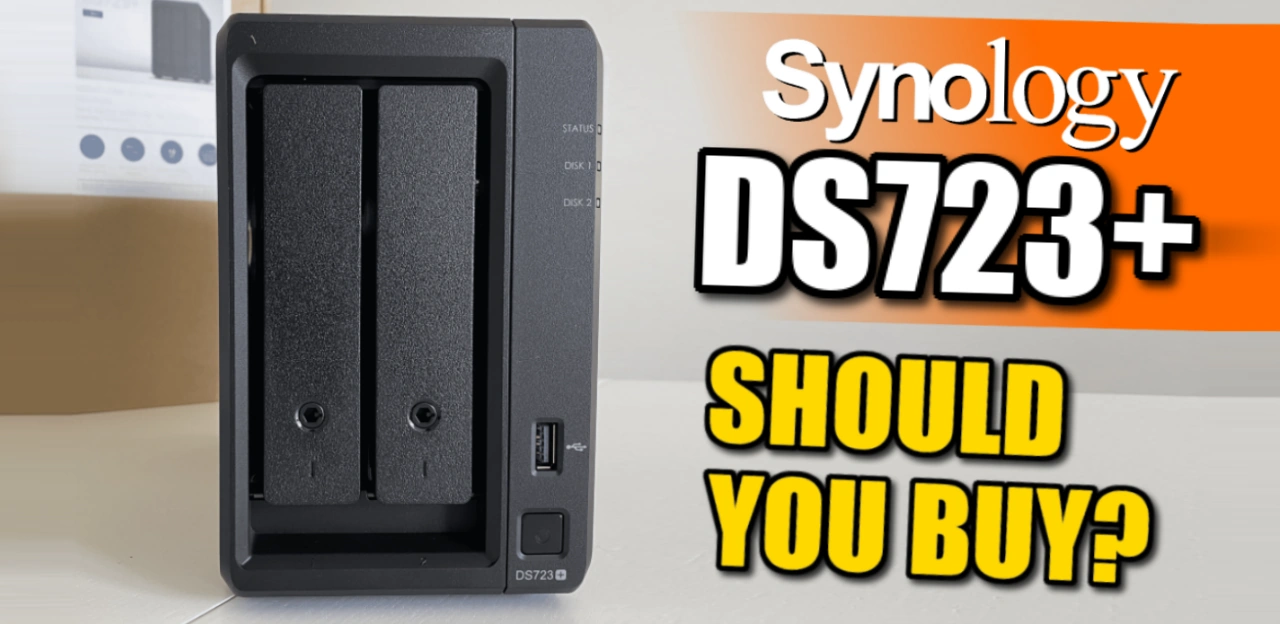



We need nases with intel 13500 cpus in them set to a low power mode to have god tier av1/hevc nas/plex all in one servers
REPLY ON YOUTUBE
Great review, but please lets leave out commentary on packaging – that’s not why we buy this Nas!
REPLY ON YOUTUBE
Synology Is apple while qnap is android
REPLY ON YOUTUBE
What would be the capacity can be used for M.2 NVME. Thanks for the video
REPLY ON YOUTUBE
The price went up since this video, seems way too high for the specs 🙁 – I’m happy to pay more but 2gb ram and the performance of a 5 year old cpu chip and 1GBE for £540? what the hell.
REPLY ON YOUTUBE
Sry Plex is lame, use Jellyfin, is opensource, no online account oder sub. ????
REPLY ON YOUTUBE
This price range, 10gb lan port should come with nas as default! Shame on Synology, greedy bastard!!
REPLY ON YOUTUBE
I need ecc for zfs. Done.
Plus, I want the power. I can stick a little cheap GPU in of needed and it’d be way more powerful.
REPLY ON YOUTUBE
: So like, can you solder off the 2 1GbE ports and put 2.5s on?
REPLY ON YOUTUBE
Thank you for this detailed overview
REPLY ON YOUTUBE
Question some of the new models do have Intel Celeron. Do those all have the same imbedded graphics as this older model ?
REPLY ON YOUTUBE
Hi
Can I put the Red pro WD 16to in the Ds 723?
Thx a lot
REPLY ON YOUTUBE
I bought a 718+ years ago based on your review. I use it predominantly for photo and home video storage. Then I use DS video on my tv to stream. I want to have a dual drive redundancy. I am torn between getting a 517 expansion unit or a 920+, 923+. What can you recommend for my scenario?
REPLY ON YOUTUBE
I’m interested in your thoughts on the overall reliability of a single 4-bay NAS unit versus two 2-bay NAS units each synced to each other to provide full backups even if one 2-bay unit failed you have four potential backups of your data and two fully independent NAS units. I have been using this setup for a number of years as my total storage volume is not great but the I have a need for maximum reliability of data storage. One NAS unit is also mirrored to Microsoft One-Drive which of course is off-site. If with time I need to increase storage I simply increase the size of the four hard drives. Any thoughts?
REPLY ON YOUTUBE
Thanks for this video!
A question: Can I have 2 DS723+, one at home and the other at work, using the same hard drives? I would take them with me, just to work local. Is it possible? Like plug and play?
REPLY ON YOUTUBE
Thanks for this video!
A question: Can I have 2 DS723+, one at home and the other at work, using the same hard drives? I would take them with me, just to work local. Is it possible? Like plug and play?
REPLY ON YOUTUBE
too expensive and network connect is STILL 1Gbps … go buy another nas.
REPLY ON YOUTUBE
It’s great to see your in-depth review of the Synology DS723 Plus. You’ve provided a lot of valuable insights into its hardware and capabilities. However, it seems like you were about to discuss the ports and connections, but the text got cut off. I’d really like to hear your thoughts on the ports and any additional features or limitations you’ve come across in your testing. Please continue with that part of the review when you have a chance. Thanks!
REPLY ON YOUTUBE
Seems like these comparisons are moot if you just connect any NAS to a Zidoo media player such as the Z9x or Z2000pro to pull the content from your NAS. Those will play anything smoothly, everytime.
REPLY ON YOUTUBE
I am looking for my first home NAS set up….back up and reduction of pics, files and video from devices increasing memory….I’m not a home business, just a techy guy in an evolving market looking to do it for himself on a budget. I think this is the way to go when im not a pro/small business.
REPLY ON YOUTUBE
I bought DS423+ after comparison reviews from your channel, and watched this video while still waiting for it to arrive. Great job! Is someone at the door? it’s my NAS arrived!
REPLY ON YOUTUBE
What about putting 50 000 pdf files in this NAS, does it has a file indexing service which will go beyond the file name and also be able to index and search inside pdfs (for digitalzed text) ? In the use case of a network drive, will the client have to do that indexing, if yes, how many weeks will that take?
REPLY ON YOUTUBE
You talked too much, Please show your audience more about its functionality or the inside or the new features or how you use it.
REPLY ON YOUTUBE
Hi
can I use two 14tb Wd red nas drives for this synology nas model?
REPLY ON YOUTUBE
What is the best 2 bay nas that has 4k transcoding, upscalable and raid 1 or higher for home use. I download movies from the internet and need storage for my movies
REPLY ON YOUTUBE
Hey, thanks for your detailed video. I’m on a 220j and planning to upgrade to the 723+. One thing I’m missing in every review is the speed improvements from the UI. As I see you also tested the 220j. Could you tell me if there is a significant improvement for synology photos, drive… and for the mobile apps?
REPLY ON YOUTUBE
Oh, hell, I’ve gone deaf. I can’t hear anything except this beep every now and then. Are you sure your microphones are working? Did the video sound channel copy into the video? No, I’ve gone deaf, haven’t I? Ship. Mum warned me about those airpods!
Also, were those seagulls or just really badly dying HDD I heard?
Keep-up the good work!!
REPLY ON YOUTUBE
Had this on in the background over a couple of days. This is the comment you requested — I made it to the end! =D
It’s definitely not in the budget for me yet, but I’m dreaming about a NAS in my setup in the future!
REPLY ON YOUTUBE
Cant wait to get one on the cheap to use as a torrent server ????
REPLY ON YOUTUBE
In India it’s cost around USD 610 which is ridiculous . I hope synology looks this comment and provide better pricing thru retailers
REPLY ON YOUTUBE
Thanks God I have ordered yesterday DS220+ with SSDs 🙂
REPLY ON YOUTUBE
I don’t understand why you would not want to optimise your CPU performance with SMT. It’s basically just saying you’re happy to have your CPU sitting idle instead of working, for a slight improvement on task completion times.
REPLY ON YOUTUBE
Synology should just sell their DSM and do away with the NAS hardware, you’re not getting a lot for the hardware.
REPLY ON YOUTUBE
I don’t know but boosting the levels by 50% just confused me more now. Why not just record it 1 meter away and perhaps talk in between for reference, then idiots like me could estimate the disturbance levels. When hearing the enterprise HDDs at 50% boost level, scares the shit out of me. I just canceled my order for HAT drivers.
REPLY ON YOUTUBE
Synology is losing its way with its primary consumers.
This NAS has too many ‘say what’ issues and restrictions for the price versus value considerations for users to buy.
There are much better options out there.
REPLY ON YOUTUBE
I find my 920+ to be a bit of a noise maker with 4x 8tb Seagate ironwolf drives it keeps humming away with some disc search sounds or something at random times and it annoys the missus big time
REPLY ON YOUTUBE
Hello I have never used a NAS before nore have any server knowledge, but I do graphics and some 3d modeling and was looking for a way to store my files easier. I currently use Dropbox but as you can guess thats slow and costs monthly, would a NAS be a easy and good alternative to that? I was looking at this model on amazon and came to this video to check it out but still wanted others opinions.
REPLY ON YOUTUBE
Hello can I ask for your honest opinion about one thing in particular in regard to DS723+?
I read many opinions online that some users face very slow data transfer from their PCs to NAS storage device or even NAS transfer to another NAS.
Could you please comment on this as you used the server?
I read that the DS723+ is not supporting WD RED PRO hard drive.
Can it be the case?
I was decided with DS723+ but if it has bottleneck data transfer I would really like to know about before buying and facing technical issues.
Just to recap I read about 4 MB file transfered for 6 minutes or 1,5 GB transfered 3,5 hour.
Have a great day
Look forward to hear from you
REPLY ON YOUTUBE
Is it 18 TB Per bay or 18 TB as in 9+9TB?
REPLY ON YOUTUBE
Hello, I am following your channel and I like it very much. I am faced with the dilemma of buying a ds723+, please tell me if it is possible to use HDD 3.5 drives with a speed of 7200 and which company would you recommend Seagate WD or Toshiba, because according to synology’s compatibility, their drives have 7200. I need 4 Tb what would you recommend? Another request for Ram memory, I watched your tests for ds923+, please tell me if the ds723+ will suit the best performance, I need two 16gb. Many thanks in advance for all your tips.
REPLY ON YOUTUBE
i did watch the whole video
REPLY ON YOUTUBE
Do you think that using one of the nvme slots to run a nvme to mini pci 2.5Gbe adaptor would work?
REPLY ON YOUTUBE
i was just about to get 723+ but I guess 720+ is better option for me ..
REPLY ON YOUTUBE
Great content! Thanks for your time and experience!
REPLY ON YOUTUBE
Was waiting for this device to come out so that I can get it but I am disappointed of the limitations no 2.5+ GB ports no USB at the back which is necessary for me to attach to ups I guess I will stick with 720+ although I needed the ability to upgrade the ram and extra power the CPU delivers :/
REPLY ON YOUTUBE
Why can’t Synology get with the embedded graphics program! If QNAP interface and software was more user friendly. Synology would really have problems.
REPLY ON YOUTUBE
Here for the pictures of Nas, staying for DS723+ review
REPLY ON YOUTUBE
I’ve seen reports of using the read-write cache option causing the entire raid volume to crash if an ssd fails, so I’m personally going to be sticking with the read cache only.
REPLY ON YOUTUBE
Hey guys – really good video. I really researched this topic a lot and decided against the 923+ or 723+ due to dual core and no embedded graphics. I will tell you though, the the 1500B Ryzen in the RS1221+ is a beast. It is by far the fastest NAS I have. My RS422+ has the Ryzen 1600 in it and I’m not super impressed. Most home users are not going to benefit from 10GBE yet because everything else in the house runs 1GBE or less. I’m sticking with the DS920+, DS720+, and RS1221+ for now and skipping the 23+ series. I think Synology really let us down on this one. Also, the hard drive selection on these from the QVL is getting stupid for something that crosses between home and business NAS for the home user who wants more power.
REPLY ON YOUTUBE
You mentioned Synology only put a single USB port on the DS723+. Well another YouTube video I posted a whine that I couldn’t plug in all my cool USB gadgets all at the same time on a DS723+ (ex: USB drive, UPS, printer, etc). Fortunately It would appear I was wrong 🙂
“Tom B Yes, my UPS and an external drive are both connected to the hub. The Synology recognizes both as if connected directly, and in fact, the UPS is set up as a UPS server to my DS220+.”
REPLY ON YOUTUBE
This unit is such a Disappointment! I was so excited to upgrade my DS214Play with this unit. Then everything about it became an absolute disappointment. For the past 15 years I’ve used two different Synology units the same way. Main unit for storage and an external eSATA enclosure for backup (single version). That way at any point in time I had an NTFS copy of everything.
They decided to lock down this unit and the eSATA port is only for Synology to use. It is not usable by the user. That leaves only one USB port. Gees! Even my DS214Play had 4 usable ports on it! Further more the USB port is slower than eSATA. So this unit is a downgrade in that regard. Now add the fact that the dual NVMe slots cannot be used as storage space unless you way over spend on Synology owned drives. Ok, so I’ll use that for cache. NOPE! It’s not cache. It’s some useless smart cache that is only used for frequently read or written files. Completely unlike literally every single cache found on any raid array controller which does both that and acts as real write cache. Then onto the last disappointment. I’m using newer 6TB Seagate Exos Enterprise drives with this unit. Very fast drives. With the 10Gb adapter installed I expected to get a good 500MB transfer speed. NOPE! Starts out at 500 then quickly drops to around 140. Why? This makes no sense. That drive gets over 300 from drive to drive in a PC over a 6Gbps connection. Should be the same over 10Gb. I borrowed a QNAP NAS from someone and set that up. An entire 20GB file transfer saw an average 480MBps (with cache). Yet the DS723+ only averages 218MBps (with useless cache).
Such absolutely pointless decisions on their part. Ah well. I should have held off longer and waited for a USB 4 storage option as this unit is a complete and utter disappointment!
REPLY ON YOUTUBE
I just purchased a 723+ and a pair of 12TB drives. With the processor in mind, did I make a mistake? What would you purchase instead, staying in the Synology family, DSM is the requirement. I am not going to use Plex ever, It will be mostly used for personal cloud and Synology Photos for local management of my family’s photos’ and videos. Would a 420+ with 4 4TB drives suit me? I plan on having this 5-8 years or more. IT comes in cheaper. But I’m staying in the $800 range.
REPLY ON YOUTUBE
I just purchased a 723+ and a pair of 12TB drives. Did I make a mistake? What would you purchase instead, staying in the Synology family, DSM is the requirement. I am not going to use Plex ever, It will be mostly used for personal cloud and Synology Photos for local management of my family’s photos’ and videos.
REPLY ON YOUTUBE
Did you check whats the read and write speed of hdd 7200rpm over 10gbe ⁶ ?
REPLY ON YOUTUBE
Hello,
I’m looking for customer feedback who install compatible RAM on the new Syno DS723+.
I’m looking for 2x 16GB RAM DDR4 SODIM ECC for the new Syno DS723+ (ideally sold on Amazon – brands like Crucia).
I specifiy there is no way I would pay for 32GB of the official Synology RAM (too expensive)
Thanks for you help
We have community based list here maybe it helps https://nascompares.com/answer/synology-nas-compatible-ram/
Is it hard-locked that you *have* to use Synology’s DDR4, or will other ECC SODIMMs work?
REPLY ON YOUTUBE
How this doesn’t have more likes is unjust. He covers so much and shows great examples. He also has time marks for reference. Great resource! Keep up the good work, would give you more likes if I could.
REPLY ON YOUTUBE
One thing I wish sonology would do especially further backup program is allow you to back up to a networked windows pool drive aka the NAS sync with networked multipooled Windows drive giving you to a form of backup even if you cannot see the data on the Windows pool that be fine if it was just an encrypted image or better yet allow the damn system to read Windows pool drives…. You’re plugging a USB hub with all your USB drives the nas makes its own virtual pool out of those drives and then it backs up just in case there’s nobody has a single 60 terabyte drive …. The fact that most people are coming from multiple hard drives externally to Nas and can’t use those multiple drives as a single pool backup is annoying especially when there’s hard drive crashes or or anything like that at least you’d have a personal backup I didn’t even pay 10-15 dollars per drive one time fee to make a pool for image backup
I literally had to Jerry rig using always-sync to back up the entire NAS drive on a 9 hard drive pool on the Windows side
REPLY ON YOUTUBE
Insert the biggest thing I hate about Synology outside of their “hard drive requirements” (if the damn hard drive says Nas supported then it should just work you shouldn’t need a specific hard drive) is them telling you where to put your media or files for specific programs they own you should be able to tell the programs just like in Plex where the files are where you wanting to put the files and have one way think as an option with no deletion
REPLY ON YOUTUBE
I personally find it difficult still for a novice user especially for making user accounts … Aka having public and private folders for individuals in a group setting (you can’t have both) we’re in the group setting everyone has the rules AKA right and no delete for public folder and the ability for only individual users in that group to only see their private folder and not everyone else’s
Aka private “Jon” public “all” private “Sarah”
John can still see Sarah’s folder
Because I haven’t nested in an outside folder public and an outside folder private where all their names are in the private folder so it’s nice and organized
But everyone can still see everyone’s folder I’d love to have it so that you can easily isolate nested folders
REPLY ON YOUTUBE
One application they should make is a network photo slideshow screen saver picture frame app with dslp and outside network
REPLY ON YOUTUBE
The one and only thing I don’t like about Synology multimedia apps or drive apps…. Is they TELL you where to put your media AND GENERALLY HAVE TWO-WAY SINK AS DEFAULT
Most users are going to have a plexa library that they’ve probably customized and should customize in one bulk “media folder” and then break it down within…. If you do stuff like that for all your multimedia they’re native apps don’t work you have to have it where they want it…. Same with sync you have to have it where they want it and it’s only sync … Me personally I want one-way sink data goes on the NAS … You can delete it off the phone or computer and that won’t transfer over…. They have improved the drive application but I still have to improve video photo and the other ones to be one way and for us to control the locations multiple or single nested location I don’t want to be told or you got to have it in the ” home /user /names/ photo/ to have the photo application work
NO I want to have it in plex media / photos/ cell phone 01/
REPLY ON YOUTUBE
why do I need raid 1 on the ssd cache? It doesn’t matter if the data is gone on the cache if one ssd fails. The data is stored on the HDD after a Data is altered in the read/write cache. or is written again from the HDD when a new SSD is added. So that makes no sense. Raid 0 would be better in this case.
REPLY ON YOUTUBE
Can you connect a USB 3.0 hub to the front USB port?
REPLY ON YOUTUBE
How can you conclude this is the best 2 bay? I guess for a business maybe. You point to things most people don’t care about: better network upgradability. Most people don’t have 10gbe though. At least not where i live. Plus it’s an option, not part of the device. The option to upgrade. I’m not sure i’d consider that more valuable than transcoding ability out the gate. Better memory? Fine but that doesn’t improve video playback.This can’t be recommend to most people who are not a business.
REPLY ON YOUTUBE
Wow. i’ve waited more than a year and Synolygy released a downgrade from a Plex perspective which 99% the reason i want to buy a NAS. So i guess either the 720+ which is fricken old. So maybe i need to look at qnap and others. honestly i don’t have and am not getting 10gbe so not a big deal in this consumer space. They shit the bed on the poor plex and it’s by far the only reason i’d be getting this. As a home user this is a massive downgrade to me.
REPLY ON YOUTUBE
Seems that synology still isn’t serving a high end consumer 2 bay for all the plex people. Need to find out what the best is cause i think 99% of the people interested in this have that as the primary use. Seems dumb to not have a cpu good enough to do the hevc transcoding.
REPLY ON YOUTUBE
I so remember when Illmatic hit in the 90s. I was i college. Legend. What’s wrong with 99 Problems. Still a nasty beat and a great song. As for Jay v. Nas. I like em both but Ether was nasty. Bodied him on that one.
REPLY ON YOUTUBE
Honestly I just need a NAS to host plex and set a download station for a private cloud but this looks lackluster and the next upgrade for a 4 bay is way too expensive for what it offers considering proprietary network adapter and forcing to buy their nvme drives.
REPLY ON YOUTUBE
I’m nearing the time I allow myself to replace my 718+. However given the drawbacks of the CPU and the lack of USB ports (I have a printer & backup USB drive connected) I might skip this one. Or does it support USB hubs? On the other hand it seems Synology is supporting older hardware a bit longer in terms of DSM updates, so I might stick to my 718+ a bit longer.
REPLY ON YOUTUBE
Thank you for your review. It would be awesome if you would measure 723+ energy consumption loaded with two 2.5″ SSD’s, no cache: sleep, idle and under max load. Especially interested in Idle.
I’ve had a 720+ for a week, loaded with two 2.5″ 256GB SSD’s in the drive bays to test. Power draw was only 5W sleep, 8.5W idle (didn’t measure performance). This really was the ultimate low power NAS. A friend of mine just picked up the 923+ and he measured 14W sleep and 45W idle (with 3 Red Pro 8TB drives). When I discard 3×8=24W for the drives the 923+ idle power draw is still 21W, which seems insane compared to the 720+. Must be down to the CPU, which is why I think the 723+ may be similar. If so, I will probably pick up a good deal on a 720+.
Thanks for your efforts! Pete.
Synology is becoming the King Gillette of NAS except he sold his razor holders cheaply. Thinking about the Nvme drives, well a heatsink would do no good, may for the first 5 minutes take the heat out but after that the heatsink wouldnt have airflow to cool it and the drive would be hot .
Anyway, a very decent review and I am just waiting for the next Synology NAS that requires Synology Hard drives
REPLY ON YOUTUBE
How does the DS720+ compare to the DS723+?
REPLY ON YOUTUBE
Thanks for this great video. Unfortunately the synology 23 line up is so disappointing. I was planning to upgrade my whole IT to 10gbe including my disk station upgrade. With proprietary memory…disks…10gbe add on costs. It has become a no-brainer … synology is off the shopping list. It’s QNAP or even a DYI freenas.
REPLY ON YOUTUBE
I can only surmise that their strategy is to sell less and make more. They seemed to find the lowest cost components to provide the absolute maximum writeup, lock you into the platform, and milk every last ounce from the their low end stuff. In one sense it is brilliant, typically you make the most of the middle to high end stuff. I could argue they make more on this low end stuff, when you add 10 gbe, 8 gb memory, and their m2.nvme you just paid a real good penny! Personally, I’m not a fan… so I’m rocking with my 453E and enjoying life, I give QNAP credit the 453E for the price is really hard to beat, they burned the midnight oil to think this one out. Reddit and facebook, etc. are pretty ticked off, lots of people frustrated, and they are talking like they have left or will leave the brand, great sales opportunity for their competitors… Time will tell if the gamble Synology took pays off, even if they come back promising xyz, they missed a huge opportunity as some will never come back to the brand, they probably considered this and are looking for the loyal customers to continue to invest in them to hit their sales goals, when everyone has to give them at least $150 USD for decent nic speeds out of the gate, maybe they do make more money in the end…
REPLY ON YOUTUBE
I can’t understand why they still haven’t added the 1522 to the list of nas supporting the storage pool with m.2 ssds
REPLY ON YOUTUBE
You are missing an important point around 20:00 in the rant about the 10Gbe ports or the lack of these ports.
the CPU supports 2x 10Gbe out of the box, they have just decided not to use this and instead installed a separate 2x 1Gbe NIC so they can up sell you for their own 10Gbe NIC.
They literally made this product worse on purpose and paid extra for this as well and they need to be called out and shamed for this decision every single day until they change it.
REPLY ON YOUTUBE
you are missing an important point at 27:40
they dont need to increase the price to add 10Gbe network ports, they actually spend extra money so you DONT HAVE 10Gbe ports by default.
The CPU in this NAS and in all new Synology units natively supports 2x 10Gbe.
All they need to do is wire it to ports and thats it.
They spend extra money to add a 2x 1Gbe NIC which the CPU does not support but that extra money is well spend for them because that way they can sell you an overpriced 10Gbe NIC afterwards.
This needs to be said in every single video about any new Synology NAS as this is extremely anti consumer
REPLY ON YOUTUBE
Ryzen says it all, why upgrade to an AMD with no video capability? Nope
REPLY ON YOUTUBE
Thanks for this video. I’m currently running a DS720+ mostly as a file server (but considering media server for music and film as current market trends for media lock in are making me unhappy) and really like it, but had been considering upgrading to the DS723+ as wanted to upgrade the networking to improve network file transfers. The proprietary networking adapter was already making me a little uncomfortable due to availability and price fluctuations, but mainly just as it is proprietary so less choice in the future. I hadn’t realised about the single USB port and the lack of integrated graphics. A single usb is a complete deal breaker for me. I always use a UPS which uses one usb port, and I run regular local USB disk backups to ensure i have backup resiliency across cloud (I use Synologys own C2 backup and really rate it) and a local copy using monthly disk rotation. If you care about your data and backup plus restore, you need more than cloud! I’ve been a Synology customer for over 10 years and am never disappointed until now. This is starting to feel like a company that are making specification decisions based on markets and sales, rather than what customers actually need, or want.
REPLY ON YOUTUBE
Glad I bought the DS720+ for $280. I have a felling that Synology might come out with a specific media server model with an Intel chip specifically for those Plex users.
REPLY ON YOUTUBE
I wish Synology would get the hint for home and small office use more USB ports = more better. Only one USB really kills the prospect of me considering this unit because you can’t have UPS and a nightly USB backup connected at the same time. Might as well get the ds923+ instead or for similar price newegg special on ds920+ if you don’t need the 10Gbe.
REPLY ON YOUTUBE
Can you do a video on setting up the expansion module for more disks?
REPLY ON YOUTUBE
Let say i running small business home, with 6 surveillance 12mb 360 cameras, dont you think 1gb eternal port is enough?
REPLY ON YOUTUBE
We operate a professional full-scale tech business and have my personal office in my home. We have dedicated NAS units at two separate locations for business use and an additional NAS for Plex to meet family member storage and backup tasks in the house.
I can state that we are no longer a Synology client. We are in the process of moving all our current and future business over to QNAP !!!!
QNAP provides significantly better hardware for less $$$ than Synology. Their software meets our current needs and keeps getting better with time! So to sum it all up, QNAP provides far better value for less money.
Both of the Synology DS-918+ units failed within a month of the manufacturer’s warranty ending. Synology was contacted and stated that the only option now is to purchase new equipment. No recommendations or discounts were provided … Great customer service!
Synology appears more interested in profits than performance and reliability, IMHO.
The DS 723+ has no embedded graphics in the CPU, insufficient USB ports, No 2.5 GB LAN ports, only 2GB RAM and a very high price point! I have one word to summarize all of this: “Ridiculous!”
Synology is a brand we will never look at or consider again. I am betting that we are not the only significantly disappointed former Synology client! Time will tell. Cheers to all!
REPLY ON YOUTUBE
Does someone know when the DS123 will released?
REPLY ON YOUTUBE
Big thanks for your work.
I have the opportunity to find a DS1522+ with 8go ram at 614 euros. Is it a good deal compared to a 923+ or even the 723+ ? The DS1621+ is at 939 euros with a 4 cores but 4go ram.
I have a DS211J, this box is still running well since 12 years…
But the speed of copying and reading drives me crazy today. I use it mainly to archive my video and photo works.
I also have a Promise Pegasus 32 R6 with 24To. It’s not really the same use of the NAS but the speed to work on my videos and photos is crazy but the communication between it and the NAS… hell to copy my work on it or dowload an archive from my NAS…
REPLY ON YOUTUBE
Synology’s pricing is getting somewhat ludicrous. Assuming this goes for the cheapest price I can find the DS720+ for right now, and populating it with the 10GbE adapter, the maximum Synology RAM along with the smallest capacity Synology m.2 drives and HDDs to avoid all of those compatibility warnings and you’re spending £1,949.91 ????
REPLY ON YOUTUBE
Are you planning a comparison with the QNAP TS-264? Is it really worth a comparison? For the money I’ll get the QNAP TS-264 instead…hands down.
REPLY ON YOUTUBE
What would be your advice for people with an older DS7xxx+ or DS9xxx+ who use Plex media server and rely on hardware transcoding?
REPLY ON YOUTUBE
Yoda hates seagulls too
https://www.youtube.com/watch?v=U9t-slLl30E
REPLY ON YOUTUBE
DS718+ three USB ports. DS720+ two USB ports. DS723+ one USB ports. DS72x+ zero USB ports?
REPLY ON YOUTUBE
I think I know where Synology’s head is at with this one – FAST FILE SERVING OVER A NETWORK ONLY.
That explains the lack of USB ports, lack of internal GPU, proprietary 10Gbit adapter, RAM, etc.
REPLY ON YOUTUBE
Heat is probably why Asus put their M.2 drives on a riser card on the TOP of their Asustor NAS devices instead of the bottom like Synology. Of course you have to painstakenly remove the entire case cover from the Asustor to get to them whereas the Synology makes it a lot easier to get to them. And Asus doesn’t do vendor lock-in with M.2 drives – they have a list of approved off-the-shelf drives you can select from and source from anywhere you like.
Right now the only issue with my Asustor4 running 32GB RAM and dual 1TB M.2 drives and 4x 4TB drives (two different RAID1 volumes) is that you can’t really run a lot of Docker containers on it or Docker will crash. I’ve even hand-upgraded Docker and Portainer on it to the very latest versions from the developers of those two software products and it will still crash out eventually. So I’ve reduced the number of containers I run on it and made sure I put memory limits on each container and so far so good.
REPLY ON YOUTUBE
Been lurking for quite some time while our google photos storage fill ups. Gonna be a first time buyer and interested in this model. Is it overkill for automated backup from two phones for photos and maybe security camera back up as well?
REPLY ON YOUTUBE
Thks & the sea-gull was nodding its head at you 😉
It seems synology’s new NASes ain’t fun for home & family anymore (ex: the DS?20+ NASes are much better for home & family). Also to upgrade their new Pro-sumer DS?23+ NASes cost an arm&leg. Maybe a DS223+ might resolve all these short-comings (?fingers-crossed?).
REPLY ON YOUTUBE
thanks for the video , will watch later
REPLY ON YOUTUBE
How hard is it to simply bring out a new version with 10gbe and a processor that can do the jobs that people want?? 2023 and still waiting, this company does not understand what their customers want.
REPLY ON YOUTUBE
Ciao . Love all your videos , I’ve learnt a lot and I haven’t decided yet to buy a NAS but getting close to it. I can see you being a Windows fan, is the software the same on Macs? Ciao from Italy
REPLY ON YOUTUBE
No 2.5 gbe and no rear usb.. not buying. Not spending another $200+ for a Synology proprietary 10gbe card to get full speed from a single hard disk and clear the transfer bottleneck on a brand new system.. this is a poor system for the price!
REPLY ON YOUTUBE
I’d like to see a faceoff with the 720 on plex transcoding…
REPLY ON YOUTUBE
No rear usb! they are having a laugh..
REPLY ON YOUTUBE
muy buena información. gracias y saludos desde Perú
REPLY ON YOUTUBE
Synology is trash
REPLY ON YOUTUBE
Hi Gang! Just a quick couple of notes for this video. I wanted to try out a different review style out (with sections separated with a flash screen) that would interrupt my dialogue at the exact moment I said the words (eg ‘let’s take a look at the…” BIG SPLASH SCREEN OF INTERNAL HARDWARE). I will continue with this for a few more reviews this week (likely presenting it better and funnier), but they seem to come across a little too abruptly in this edit. 2nd thing, the 10GbE testing of this device will be in a separate video (though it does mention 10GbE tests in text in the intro). I do show the adapter working/installed in the system+ DSM, but rest assured much more detailed 10GbE tests are coming very soon. Have a great week!
REPLY ON YOUTUBE
Looks like Synology just wants to capture users in their DSM walled garden, then gouge them for their overpriced, inferior proprietary hardware. No thanks.
REPLY ON YOUTUBE
Just upgraded from a DS1812+ recently and ended up with DS920+ instead of the 923+ purely because Synology opted to use an iGP-less chip for the new generation. There are ryzen embedded chips with igp. So disappointed with Synology for cutting out the igp in their new prosumer models.
REPLY ON YOUTUBE
@NASCOMPARES I would be interested in seeing the 923+ against competitors that sports an AMD processor to see how they compared with file IO. I suspect they would be close, and I wonder what the price differential would be?
REPLY ON YOUTUBE
It’s the same shit like ds923+ for home users. Also the expensive Synology rebransed componenrs (ssd, ram, 10gbpe)
REPLY ON YOUTUBE
What 3,5 drives would you recommend to be as quiet as possible. NAS will be located around 3 meters away from watching/media center position?
REPLY ON YOUTUBE
Awesome. Keep it up buddy.
REPLY ON YOUTUBE
I understand that Synology have to hit an appropriate price point with their 2023 NAS devices, but for the same price one can buy a considerably more powerful QNAP. I would like to have a NAS with Synology software and more powerful hardware. I would be happy to pay more for that. Unfortunately, Synology don’t seem to offer this in their latest hardware.
REPLY ON YOUTUBE
Wow. Synology DS723+ is a collection of avoidable annoyances to leave buyers hesitant and dissatisfied. Could have been great. Could have been acceptable. But, instead, is unnecessarily disappointing.
REPLY ON YOUTUBE
You never mentioned power consumption (i dont think?). When compared to the ds720, which is best on purely power usage over a 24/7 period? I am looking at a 2 bay solely to run my ip cameras 24/7. My 1821 would do everything else. So I’m happy to get the 723 (as the newer unit) if power consumption between the two is negligible.
REPLY ON YOUTUBE
Thks & DS223+ or ?bust? (fingers-crossed 😉
REPLY ON YOUTUBE
I found it funny you had the 10Gbs OPTION as a big positive, then you were pissed off at the end it wasn’t standard. Love your vids mate, you are the real NAS master and I’m sure you’ll rate higher in google than that rapper in a couple of years! 🙂
REPLY ON YOUTUBE
Proprietary is a non-starter when it comes to storage
REPLY ON YOUTUBE
**Help Needed**
I have several Apple products and a big PC. I have several 1-2 TB hard drives full of over a decades work.
I’m about to start a business that will be 4k video (1080HD) and picture heavy for media presence.
I took out a 3tb Drop Box account but hate the Drop Box interface and have been flirting with the idea of buying a NAS system; 2 x 4 Tb’s to start with.
Was looking at Synology 2 bay. Could not decide between the 20+ or the other model (around £175). Deciee to wait for the new 2 bay with USB C etc.. but it seems that’s been a bit of a blow out.
What is the best path forward? I don’t want to be too complicated. I just want to store all my stuff in once place and be able to access it across platforms (Mac/PC) and move on with my life, instead of having drawers small HD’s and an annoying drop box that I’m near filling up anyway.
REPLY ON YOUTUBE
Glad I Grabbed a 720+!
REPLY ON YOUTUBE
So glad I purchased the DS920+ and will be using this until its end of service life…then goodbye Synology, hello QNAP
REPLY ON YOUTUBE
QNAP allows using EdgeTPU on the m2 slot. Does 723+ offer such a possibility?
REPLY ON YOUTUBE
You wasted 3 minutes of my life with the artsy-fartsy intro. Stick to what you do best.
REPLY ON YOUTUBE
I love you man your the white noise for my bad time.
REPLY ON YOUTUBE
I bought DS923+ a month ago as a replacement for my aging DS414 and couldn’t be happier with it. All I need is a fast and reliable file server. With 10GbE add on card I can access the volumes as if they are internal PC drives. And I work in VFX business so I’m hitting my NAS hard all day. Couldn’t care less about the plex (which is fine with H264). I don’t understand what the fuss is all about. This is NOT a product for home users wanting a media server. This is a fast business file server. And it just works. Set it and forget it. And what all that QNAP OS crap I wouldn’t touch it if they were free.
REPLY ON YOUTUBE
Synology lost me when their removed their USB DAC/Speaker Out functionality. That was really the only reason why I stayed with Synology because it functioned as a beautiful control for my hifi and streaming. It was all so nicely seamless. Removal of this feature basically freed me from Synology. I no longer have to stick with it and accept all those limitations described in the video. The world opened up.
REPLY ON YOUTUBE
I have returned my 1522+, the value is not there.
I did prepared 32 gb ddr4 Kingston (2×16 Gb), with 2 x 1Tb Samsung 980, for pool storage, 4 x 8 TB Seagate and 1 x 16 Tb Toshiba.
After setup I’ve received a notification about my ddr4, then for my pool M.2 drives,
then even for my Seagate 8 Tb HDD’s, that all are not compatible.
Nas was working but like this – no thank you.
There is no value for it, at least for me.
REPLY ON YOUTUBE
I need more breakdowns of Rob compared to other hip hop artists circa late 90s to late 2000s.
REPLY ON YOUTUBE
Proprietary stinks
REPLY ON YOUTUBE
Only:
1 GbE ports!
1 USB port and only 5Gb
2 Gb memory
Only Synology NVMe disks
No PLEX support
It’s a joke!
DS723+ should have been named “DS723- – -“ and priced much lower
REPLY ON YOUTUBE
NAS is an alien to me. I would like to build my home photo server. Based on my reading, Synology has the friendliest server & client apps for this feature. Is that right?
REPLY ON YOUTUBE
With every new device Synology release, I get more glad I bought a DS920+
REPLY ON YOUTUBE
Will not buy Synology. So dumb.
REPLY ON YOUTUBE
I only have one thing to say, 32GB of ECC Synology memory costs more than the Nas itself.
REPLY ON YOUTUBE
Think they have shot themselves in the foot, this one is not for me!
REPLY ON YOUTUBE
Synology , artificially hobbled this drive, and that’s not good business for their customers…
REPLY ON YOUTUBE
Great intro ????
REPLY ON YOUTUBE
As a home user I wasn’t “a little bit disappointed” with the CPU I just ruled it out instantly, same with the 923+. Also as home user have 2.5 let alone 10Gbe is an irrelevance as is ECC. I play Plex and I view photos and store the off files. I don’t use mobile so everything I play is at home, through the latest Apple TV+ 4k so in practice the 723+ will work fine as the Apple TV+ handles everything but it’s still a show stopper for me…because for me its a step backwards. However, I still watch videos from you like this as they are so informative. Keep it up
REPLY ON YOUTUBE
Sounds pretty low compared to QNAP 253 and Lockerstor Gen2 Drive, Very disappointing
REPLY ON YOUTUBE
Thank you for this Video!
REPLY ON YOUTUBE
Funny how that Security Advisor isn’t barking at you for having the standard 5000 and 5001 ports in use. Mine’s been yelling at me 24/7 about it.
REPLY ON YOUTUBE
That really is an in-depth and thorough review. I’ve had the DS1621+ for about a year and you’ve helped explain what some of the apps actually do. Thank you.
As a photographer using Lightroom to manage my my photos, I still cannot understand why I need Synology Photos or S Video to manage them?
REPLY ON YOUTUBE
Thank you for the detailed review. I am interestedin buying a new Synology Nas (920+) and i own an old XP 32 bit PC do you think there will be any issues about compatibility from Win XP 32 bit to the DSM 7.1 Synology NAs, in that case does any workaround exist?
REPLY ON YOUTUBE
Synology could have used 1605 chip with integrated graphics and had AMD hardware transcoding for a couple of extra dollars, instead crippled the DS21,22,23+ models for plex
REPLY ON YOUTUBE
I’m the one who watched the whole thing! And some bits twice. Very helpful in trying to decide between a Synology DS923+ and Qnap TS464. Synology seems to have the upper hand software-wise which I suspect carries more weight for a home user than the superior hardware of the Qnap? Thank you for providing this extensive review!
REPLY ON YOUTUBE
My dude, another spot on video – can guarantee you have helped more than one person make an informed decision.
I have been holding and holding with my 214play (bleh) to see what XXX23 brings and it looks like XXX20+ is still the answer for the prosumer/transcode user.
Perfect level of information and impartiality (I’d call the new releases a hot steaming pile, but that’s just for my use case) – lets hope they’re not gearing up for a quad core DS923+Play++GOTYE+Platinum+++++ with an onboard graphics!
REPLY ON YOUTUBE
Awsome information. Now please a similar video on Qnap. I cant make up my mind as I need both photo management and video surveillance. It seems like Qnap and Synology takes 1 point each.
REPLY ON YOUTUBE
Jellyfin?!!! Most channels that review media server software, either only deep-dive their preferred offering, or only give an overview compression of the field. If someone like you, who can give the same enthusiasm creating two videos deep-diving two NASs that only differ by a drive bay, puts that into a spin-off series on a topic that is close to a large chunk of your demographic, that would be a real treat.
REPLY ON YOUTUBE
Thks & I just watched it again & most excellent;
I’m a retired physicist & have no real problem understanding the infinite details.
However my problem is how to keep it simple & stupid (ex: high tier levels of simplicity, brevity, encapsulation, etc).
Oh with my goal is to sociably knit-together all my family, relatives, friends, etc on my synology NAS.
Unfortunately I’m going to be Mr Tech support for them. Sooooo I gots-tos keep-it-simple is an understatement & I will be abused (I says anything for family/friends though ;).
REPLY ON YOUTUBE
I’m also only seeing 360. Can’t make out any screen. text
REPLY ON YOUTUBE
You’re a DSM PhD;
I never hear so dense of a presentation of great DSM info & my head is still spinning, thks.
Next-time, you think about having something good to drink every-once in a-while.
REPLY ON YOUTUBE
47:05 Where, When
REPLY ON YOUTUBE
Still only 360p for me
REPLY ON YOUTUBE
Still just in 360p
Hope it will fix soon.
Thx for all the effort!
REPLY ON YOUTUBE
Watched you video from begin to end! Loved the deep dive into DSM, since I am looking into buying a new Synology. Keep up your amazing videos!
REPLY ON YOUTUBE
Nice video. Does anyone know why my USB printer doesn’t work anymore on my Nas Synology ?
REPLY ON YOUTUBE
Thanks for a great video. Really explains what everything is. Recently got my NAS and been already updating hard drives in it. It will mainly be used as a PLEX Server but already considering what i will do when i start upgrading the smaller drives in it. May consider another NAS and use it as strict data back up and maybe a synology Drive / synology Calendar and Email setup. Move my calendar off Google’s stuff. We will see If i do that at some point. Great job again
REPLY ON YOUTUBE
Thank you for all the work you put into this. Very helpful.
REPLY ON YOUTUBE
920+ for me !! , I some times I do not understand Synology ?! just upgrade the Intel Cpu with 4k support and you have ours wallets !!
REPLY ON YOUTUBE
My English man!!! What a video! Greetings from Greece! I really appreciate your hard work and that content. I have a DS 1520 + and I am not regretting getting it although the new 1522 is out. You have my admiration. Keep up the professional and good work.
REPLY ON YOUTUBE
Why only 360p is showing ????
REPLY ON YOUTUBE
Would it be too much to expect something similar for QTS?
REPLY ON YOUTUBE
Why 360p? Can’t see it clearly.
REPLY ON YOUTUBE
Wow ! What an episode – a full tutorial for everything ! A one stop shop – Thanx Robbie ‘ol mate !
REPLY ON YOUTUBE
Yes was wondering why its. 360p till saw the comments
REPLY ON YOUTUBE
*Note* – Regarding picture quality, this is a BIG video (so many features to cover in a single video) and YouTue can sometimes be a little slow to process HD and 4K uploads, so if this video is in low-quality for you, maybe come back in an hour or so, as YouTube should have finished processing it and have the 4K, 1080p and 720p versions done. Thanks for watching and hope you enjoy the review of Synology DSM 7.1, featuring the DS923+ NAS.
REPLY ON YOUTUBE
the 920+ has some stuttering during playback. it wil just freeze for a tenth of a second during playback (like the spiderman-scene at 8:40 when they’re talking, 8:49 with the large screen, at 9:00 during the fade-in). That would be unplayable for me because it’s very noticable and annoying. Could it be that the settings were wrong for playback in plex? That it’s playing back in 24p instead of 23,997p and that’s why you get stuttering?
REPLY ON YOUTUBE
The Synology DS923+ NAS Review is now LIVE! Find it here – https://nascompares.com/2022/11/16/synology-ds923-nas-review/
REPLY ON YOUTUBE
I absolutely LOVE my 920+. I have had zero problems for 3 years now.
REPLY ON YOUTUBE
I’m sorry but this videos is just misinformed. The integrated graphics are not used for transcoding. There are dedicated chips for this purpose. The memory is a huge boon and the base model wattage is 15 not 25. They could have stuck with Celeron but the amd isn’t bad and was specifically created for embedded unlike the celeron.
I think it’s a smart move
REPLY ON YOUTUBE
Great video ????
Was wondering if you have a link for that video trailer which you showed last? I believe it was a Hevc 4k
60mb/s ?
Would like to DL it and try some tests on my end !
Cheers
REPLY ON YOUTUBE
Changed from. 1817+ to 1821+ resulted into 3.5gbit to nearly 7gbit performance of a single 10gbe copy from my pc
Same Intel card, same hdds… Just the Nas changed.. Thanks ryzen…
REPLY ON YOUTUBE
*Intel Celeron J4125* : _Release Date Q4 2019,_ 4-Core CPU with Integrated Graphics (Synology 2020 NASes)
*AMD R1600* : _Release Date Q2 2019,_ 2-Core CPU with no Integrated Graphics (Synology 2023 NASes) Progress ? ????????????
REPLY ON YOUTUBE
Thank you for this video. It was a big help in making my decision to buy the DS920+. It’s a great NAS and I am so happy I bought it.
REPLY ON YOUTUBE
Oooooooooooh;
Synology DS1522+ NAS Video Station Testing 4K & 1080p https://www.youtube.com/watch?v=ZLTVjScmU-w
REPLY ON YOUTUBE
i’ve watched your other vidoes of 4k comparasions but these NAS are not able to play HIGH BITRATE 4k content. So if the intel CPU is powefull enough then what is creating the bottleneck? because streaming is mostly IO bound process (as contracy to cpu bound process which requite more processing power) so processorer can’t be bottleneck. what are everyone thought on this?
REPLY ON YOUTUBE
IGP missing is not good
REPLY ON YOUTUBE
Im going Qnap next time. Syno is just doing everything wrong lately
REPLY ON YOUTUBE
Hello guys. I’m really confused ???? I want to buy a NAS but what should I buy? Synology? Qnap? What processor? I want to use it as a media player. Most of my video’s are 4K or 4K HDR/Dolby vision. Please some advice? Thank you.
REPLY ON YOUTUBE
Hmmmm …. AMD is famous for it iGPUs.
???????????Welllllllllllllllllllllllllllllllll why in the heck didn’t Synology just put a AMD CPU with iGPU in their darn home/office NAS???????????? (no entiendo senor 😉
REPLY ON YOUTUBE
I ended up buying the 1522+ as I was hopeful it would have a graphics processor but come to find out that it’s not really needed and not a hill to die on to be honest. Better option is the 10GBE (that should have been included) as a future proof option and more ram. If embedded graphics is a must for plex then just buy a NUC or use a old computer for a Plex server. Most if not all formats play on newer devices so transcoding isn’t needed.
REPLY ON YOUTUBE
I think even the seagull behind Ed was totally unimpressed by the argument for AMD. Of course if Synology’s aim is to have a separate range of commercial NAS and a separate range of consumer, media, NAS then fine.
But they should announce their intentions as I guess half their customer base wants Plex and also 1gb Ethernet and has no use for 2.5 gb or non embedded graphics
REPLY ON YOUTUBE
Trying to “both sides” this is a bad look for your credibility as an independent reviewer. Call it like it is – this is a bad move from almost any angle, and the few advancements in the -23 series are things that could have easily been achieved with a newer CPU with integrated graphics. Synology cheaped out because they got a good bulk deal on low end Ryzen chips, and their product lineup is going to suffer for home users for the next few years because of it.
It feels like you’re so committed to Synology because your YT channel relies on them being successful, so you don’t know how to react to bad decisions like this other than to put on a brave face.
REPLY ON YOUTUBE
14:53 really says it all….
We have no issue with AMD powered CPUs if they would have the same or better GPU power which the R1600 has not… APU NAS when?
REPLY ON YOUTUBE
What is the NAS going to be used for? I think with the support of virtual machines and containers, your NAS can also double as your main home server. If that’s what you’re looking for, I’d say go QNAP.
That’s what I did. I bought the QNAP TVS-H1288x. Yes, it is expensive, but it also serves many purposes in my home. I have a Plex server, along with a Windows 11 and Ubuntu VM running, and a few containers to handle various duties in my house. It has 4 2.5Gbe ports, 2 10 Gbe ports, and 2 Thunderbolt 3 ports for any imaginable network needs you might have. I can still add a GPU if I want and I’m currently only using a portion of the machine’s potential. So I won’t be needing to upgrade this H/W anytime soon.
If you just want a NAS, then the CPUs offered by Synology are more than capable of handling the task. I prefer the Synology S/W over QNAP, but Synology needs to up their H/W game to include at least one 10Gbe port on every model they sell. Buying a NAS today with 1Gbe ports is a waste of money, and quite honestly link aggregation does not do the job. I have an old DS1512+ that is over a decade old and still running fine. None of these new 2023 Synology boxes you’ve been discussing offer much more than that old DS1512+ I already have as far as a NAS is concerned.
REPLY ON YOUTUBE
Would it be a possibility that Synology developed a “graphics card” to plug into the pci-e expansion slot? So you could choose between graphics acceleration or 10G adapter.
REPLY ON YOUTUBE
I just have a separate pc that comes on, on demand for when I need to play Plex media. It boots in 10s so it’s fine. I’ve given up on wanting to use a NAS for videos.
REPLY ON YOUTUBE
Had moved to 1621+ last year, i never found losing the gpu cost me anything. My prefered way to watch video is through ds file and native player, both in home and on the go. I don’t had much those extreme high bit rate video file outside of a select few of collections. Those are wast of storage and money in my opinion.
REPLY ON YOUTUBE
This whole apparent myth about threads = cores is BS. Even at slightly higher clock speeds, the R will underperform vs. the Celeron in a server environment especially, when running multiple processes 24/7 is key. If they had opted for a 4c/8t ofc no contest, but they didn’t. Incidentally that also makes the whole point about more RAM totally moot. Not to mention the lack of iGPU, which makes this plus generation utterly irrelevant to many of the usual customers in this segment. Oh, and that’s not even mentioning the outdated 1G NIC which is laughable at this point.
Btw, Pentium branding is also gone as well as Celeron in case anyone wonders.
I like the back and forth that you guys do though. It’s a great service to your viewers, and ultimately help them choose the right product, ofc on that note your advice should be to avoid this plus generation all together because it’s nothing but a cash grab on Synology’s part 😉
REPLY ON YOUTUBE
I hope they will start using N300 cpus with alder lake E cores, until that i wait for next NAS
REPLY ON YOUTUBE
I wanted to buy a new NAS for Plex/Jellyfin but these new ones are just useless to me…
REPLY ON YOUTUBE
I’m very disappointed about there being no integrated graphics because I think most home users are going to want to play movies on it. Luckily I didn’t hold out on the 923. I gave us waiting and bought the 920 and I’m glad i did. Seems like Synology is definitely heading down the business market on the small units instead of home user.
REPLY ON YOUTUBE
Nothing news on ds1823+? Will use standard hard disk or synology ones?
REPLY ON YOUTUBE
AMD makes power efficient APUs with integrated graphics – the Ryzen U series processors. The Ryzen 3 5400U has 4 cores, 8 threads, 3 GHz base clock, 4 GHz boost clock, and integrated graphics, all with 15W of power consumption. It seems like that APU would be a perfect fit for a NAS that is going to be used to decode and stream 4k video. It may increase the cost a bit, but consumers who want to stream 4k video from their NAS probably would be willing to pay it.
REPLY ON YOUTUBE
I’ve been using Synology NAS for 11 years on a 1Gb/sec wired network and am a Plex user. I’ve experimented with various setups to maximize 4K video delivery to various output sizes, as in iPad/iPhone, PC/Mac, 4K smart TV and 1080p projector. Any time a 4K video had to be transcoded to another size, the Synology CPU was buried. By one user. I found out that the Apple TV 4K also performs transcoding of 4K input to match the display it’s connected to. So the server no longer needs to perform the transcoding (unless I’m on my iPhone/iPad, which requires transcoding, and it isn’t pretty)! This means that the Synology NAS needs less processor cores/speed (in most cases) when transmitting video media.
I, too, am awaiting a new Synology box that provides 4 or 5 discs with at least one 2.5Gbs network connection and a processor/GPU configuration that supports fast video decoding. Without that option, I have no need to upgrade. Synology’s focus is not on multimedia so I look to the near future with doubt. Perhaps Intel will eventually create new devices with this market in mind.
REPLY ON YOUTUBE
I wanted to upgrade my 713+ / DX513 to an 1821+.. ( 1823 ? 1824?..)
If it came out with an R1600 I wouldn’t take it.
I’m ready to put 100 euros more and have power
they piss off synology not to offer a powerful NAS with graphics
REPLY ON YOUTUBE
Not that TDP means much at all, but the R1600 is 12-25w. The old J4125 was 10w. Current Celerons are 40-60w. The R1600 has a graphics version and all R1600 support 2 10Gbe. They could have at least given people that. The R1600 from a computing standpoint beats most celerons and people do want to run docker and maybe VMs, so gimping it with a weak CPU would have been a bad decision.
REPLY ON YOUTUBE
So, I have a DS1821+ with an AMD CPU and all my media on it; Photos, video, and music. I run Plex on an old Dell Latitude laptop with a 2nd Gen i7. I stream my media to 2022 Apple TV’s. Not a single day buffering, local or remote. Works for me, or I’d say so.
REPLY ON YOUTUBE
It depends on the use of the NAS – for me, the primary function of my current DS920+ is to run a Plex Server for remote devices not direct connected devices – in this case, having an IGPU is very important for me so I was naturally disappointed with the DS923+ using an AMD Ryzen which means I now have to look at QNAP or Asustor Lockstor 4 Gen2 with the N5105 CPU when it comes to upgrading – that or switch to using a Windows PC to run Plex which is not desirable due to power consumption
REPLY ON YOUTUBE
Synology is going in the wrong direction. They dropped the ball across the field with not only the cpu shift, but not investing in their hardware. Their software is getting stale as well. They clearly are about bottom line profit and not about product… I’m done with them. QNAP is putting money and thought into what they are doing, I’m with them.
REPLY ON YOUTUBE
synology needs to sell its operating system or with subscription like qnap.
REPLY ON YOUTUBE
I am 100% with Eddie here. This is a pure business release of products cause they “had” to put out their xx2/3 models. Its obvious for anyone that knows this product category that these amd cpu`s is not suited for these nas`es. They are only in there to give themselves a bigger profit.
They fail on both power consumption and media which is a big deal for this product category. Feel sad for those ending up buying these without knowing this big flaw.
Not to talk down on amd cpu`s btw, They are great for many things.
REPLY ON YOUTUBE
Both Intel or AMD is generally fine, lack of integrated graphics is on Synology. I would be happy with DS423+ if it had integrated graphics, but i doubt it will if it’s not Intel CPU, since 4xx+ usually has cheaper CPU and AMD with graphics would be more expensive.
REPLY ON YOUTUBE
Intel for video encoding, no contest. I have a old QNAP Intel system that I want to replace with a new modern Synology Intel system but Synology don’t want to supply one.
REPLY ON YOUTUBE
I was looking forward to 723+ and 923+ but without embedded graphic and still only 1gbe speed, I will not buying them. Very disappointed!
REPLY ON YOUTUBE
Integrated graphics is a must for plex and with camera’s in mind. But I also find it stupid that intel still does not support ecc memory. I also think that they should support it.
REPLY ON YOUTUBE
I’ll be looking for a Plex NAS in the next year and I want one with a GPU. If they’re are any available then I may have to look at a Mac Mini or such.
REPLY ON YOUTUBE
For virtual machines, I still think the intel is better, and I agree also that for home users integrated graphics is better match for a NAS.
REPLY ON YOUTUBE
Please, Unraid vs TrueNAS. I’m fed up with Synology’s cheating out on parts and charging tons with crippled systems, with no GPU/ HW encoding, dual cores in 2023, No built in 10GBe. I was waiting for years to upgrade my DS916+ which is still rock solid, but I need to run VMs (I run 1 virtual DSM currently) and to have extra power for more dockers Plex, and I needed more than the 8GB RAM I have and a built in 10GBe.
I’ve already bought a Lenovo mini PC from 2010 with 6 core 12 threads Intel CPU and upgraded it to 32GB DDR4 RAM and installed Proxmox for my VMs, but confused whether to install TrueNAS or Unraid for Plex and shared drives.
Thanks for all the efforts mates. I’m an avid follower. Keep up the great work and salute to to seagulls, lol ????????
REPLY ON YOUTUBE
Thanks gents, this is The Question.
REPLY ON YOUTUBE
People love trying to cram as many apps on their NASs as possible, and that usually ends up being the problem. Setting up a Plex server on an old PC that has a GPU can be a much better option. You can still keep all the files on the NAS. Either that or transcode everything into a codec that works on your NAS. Handbrake can batch convert stuff, and works with a large percentage of GPUs for doing things like this.
REPLY ON YOUTUBE
What we need is synology software on Qnap hardware,synology really sucks when it comes to the hardware
REPLY ON YOUTUBE
Much appreciated! ????????????????
REPLY ON YOUTUBE
Would it be possible to link the test files? I’d like to do some testing myself!
REPLY ON YOUTUBE
I think a great video you should make should be a high end build of a nas.
REPLY ON YOUTUBE
What are the sizes of the Ultrastars vs Red’s? I have 18TB 7200RPM Red Pro’s and they sound just like the Ultrastars.
REPLY ON YOUTUBE
Is there a big difference in power draw in this kinda of use case between the two?
REPLY ON YOUTUBE
So, if I’m not wrong if I would watch a 4K HEVC HDR 10bit 60 mbps movie (a BD-REMUX) I should buy the DS920+ right? There is something you are constantly repeating: a client hardware support, what is that???
If I have a LG C2 OLED TV an Apple TV 4K connected on it and a DS920+, will I have a good experience watching movies on 4K HEVC???? Cause I don’t know if I should wait until DS923 releases, what do you recommend me?
REPLY ON YOUTUBE
I bought the 1522+ with all my media is HD not 4k it works great. the browser side only seems to work with mp4 videos not sure why. I really like your videos thank you.
REPLY ON YOUTUBE
0:18 wait a minute, that wasn’t a square!
REPLY ON YOUTUBE
Thanks for your videos @NASCompares 😀 They have been helping a lot, especially your DS1522+ coverage! By the way, during DS1522+ manual download for Plex, after clicking Synology (DSM 7), which package should I choose?
REPLY ON YOUTUBE
Let’s be honest, unless you have the need for server specific features such as transcoding or watch history sync across devices or other shenanigans, you’re going to have a hugely better responsiveness/playback experience on a dedicated device such as Apple TV, or other beefy SBC running Infuse, Kodi or the like. And they can stream at pretty much all resolution/bitrate/codec from any potato or even the lowest tier Synology NAS 😉
REPLY ON YOUTUBE
I’d probably go with the DS1522+ as it’s newer and has a 10GBE option and if finding I need the transcoding engine I’d just buy a NUC and take the load off the NAS
REPLY ON YOUTUBE
You didn’t cover my standard usecase. I have 4k files on server, but on device I watch 1080p or 720p due to bandwidth.
If I understood correctly in case of transcoding new Synology NASes absolutely unusable for two or more users simultaneously
REPLY ON YOUTUBE
Why is Synology abandoning Intel? Plex users are a large percentage of their customer base.
REPLY ON YOUTUBE
Very good video and review of both products.
REPLY ON YOUTUBE
TLDW; Direct Play works fine on any relatively modern CPU architecture, and the slight increase in raw CPU computing power in Ryzen makes no real world difference when playing media in their original format compared to Celeron from a few years back. But the 1522+ is hot garbage anytime you need to transcode. If you ever need to stream outside your own network when traveling, or sharing with friends, or with client hardware that doesn’t support some of your media files, then the 1522+ is functionally useless for you and will be a giant headache to manage.
I don’t know why you had to sugar coat it with trying to think up cases where the 1522+ would be “good” for Plex – in the real world, you’re going to have to spend an inordinate amount of time checking your media formats to make it work when you just want to watch a movie on your NAS. That’s a terrible user experience compared to the 920+, which “just works” for Plex.
REPLY ON YOUTUBE
Can’t wait for them to go on sale
REPLY ON YOUTUBE
Just the comparison I’ve been looking for! Probably masochistic as I already bought the 920+
…Love how that every time I watch one of your videos there are more hardware and boxes in your office. Waiting for the video ‘coming to you from behind the Synology boxes’
REPLY ON YOUTUBE
Man, I was thinking something was seriously wrong with the DS420+ I just setup with the 8TB Iron Wolf drives from Seagate. That grinding/crunching noise is crazy (it’s currently backing up my entire desktop which is several TBs). The strange this, I have two of the 6TB drives in my desktop and they’ve never made that kind of noise even with continuous writing of recording video.. not sure why it’s so much louder with the NAS. Thanks for posting this… now I know it’s “normal”… yikes.
REPLY ON YOUTUBE
This is such a useful video; thanks for the comparison!
REPLY ON YOUTUBE
The WD Red’s are pretty quiet. I have a new 1522+ w/ some reds on the way. This gives me some relief… thanks!
REPLY ON YOUTUBE
Not sure if this is the right link in your video description as it links to your channel and not a playlist:
“Full YouTube Playlist on Synology DSDS920+ Hardware/Software Videos – https://www.youtube.com/channel/UCFyP17HoU-vpxhIpGXnXx2g/search/search”
REPLY ON YOUTUBE
Jesus christ those Ultrastars. Haven’t heard crunching like that in years.
REPLY ON YOUTUBE
Actually a useful video.
REPLY ON YOUTUBE
The overall sound level on this video is low. I’ve cranked up the volume but still don’t hear much. My own DS420+ unit is way louder and I’m just talking about the fans. I’ve set them to “Quiet” mode but they spin pretty fast still (with very low ambient temperature; “Cool” mode yields the same result as both modes have the same minimum fan speed). The fans also make an annoying ticking sound (with no hard drives installed). Synology support tried to help but were unable or unwilling to comment on the noise the fans make. If I had watched this video, I would have thought having a DS420+ or DS920+ (use the same fans) would be fine in a living room. In reality, my DS420+ is way too loud and makes annoying ticking noises (without hard drives installed; many other users experience it as well, and I seem to hear it on your recording super faintly as well) so it is an absolute no go in a living room. Unless I can confirm something being wrong with my unit (Synology would not do it, but I’ll see my dealer), I’d say this “noise test” is very misleading. Remember, I’m talking just about the fan noise and a system which is not under load. Still super audible in a quiet room and the ticking noise of these apparently very cheap fans is unacceptable.
REPLY ON YOUTUBE
Thanks for this. I caved and grabbed the WD gold drives for the warranty, without really appreciating the 7200 vs 5400 RPM noise difference. Luckily I have a closet where I keep my NAS. I’m going to borrow the dampening idea others brought up.
REPLY ON YOUTUBE
0:13 title says you’re testing a QNAP TS-464 ????????
REPLY ON YOUTUBE
I have two wd inside Red Plus. Very loud. And the synology has a Vibration problem. All Vibration will be given to the ground. So if you buy this, remember you need own room, place for this. If you work in the same room, you will through this stuff out of the window.
REPLY ON YOUTUBE
maybe add some rubber padding on the 7200rpm drive tray for a little improvement and yes the seagulls must go. I believe they taste like chicken.
REPLY ON YOUTUBE
Its an odd series, but I like it.
Reinforces why I don’t want or need enterprise drives in my home office space.
Not sure if going as far as SSD’s for my use case and NAS placement, not a huge Db difference.
REPLY ON YOUTUBE
I cut out some small felt squares and put them under the “feet” of my 920+ where it contacts the desk it sits on. This cut down the vibration noise to a point where it doesn’t bother me being on the same desk I work on.
REPLY ON YOUTUBE
Good grief. I’ve been watching a ton of your videos, educating myself on what to buy (waiting for DS922+). I’ve heard you mention hdd noise level several times but this really drives it home. That pro version would drive me mad! Thanks for your time and efforts, much appreciated.
REPLY ON YOUTUBE
I am using DS920+ with 3 WD RedPro HDD. The noise level when start doing storage building is quite annoying. After some researching on Reddit, I put on the foam on the HDD mount rack and placing the HDD to continue building the storage. Noise level improved and with less vibration. But improvement level still has gap, and the sound generating during the storage build likes boiling eggs in a lid cover stew pan. Hope after the storage build, noise level will have substantiate improvement.
REPLY ON YOUTUBE
i have a DS720+ with 2 x WD Red plus 6tb near silent on “cool” fan mode.
REPLY ON YOUTUBE
Indeed. I have Ultrastars in a DS918+, epic performance, atrocious noise which is why it’s placed in the cellar 😀
REPLY ON YOUTUBE
You say niche… I say really like the sound series. Many thanks for covering this. I’ve been looking for reasons to switch to SSDs 😀
Related-ish would be interested in any video/discussion/thoughts on the performance benefit of switching (say) a 2-bay or 4-bay (Synology) to SSDs. The NAS in question is used for a few things, and is broadly IO bound rather than CPU or RAM.
REPLY ON YOUTUBE
Same NAS with (4) WD Reds 3TB each. I have the NAS in the basement with a nice 65 degrees F (18C for you non-US bunch) so I keep the fans on quite mode and the drives are running at 82F/28C all the time. Being its not on my work desk or anyplace anyone will hear them, noise is not a killer issue. At some point I do need to upgrade my drives since I am running a bit short of space (75% at the moment) and eventually will look for larger drivers and might look into the noise levels to see how newer drives stack up to these older WD drives.
REPLY ON YOUTUBE
Except for one tiny spike – those WD Red Plus drives are really quiet. Impressive.
REPLY ON YOUTUBE
I have one. It has no noise at all)
REPLY ON YOUTUBE